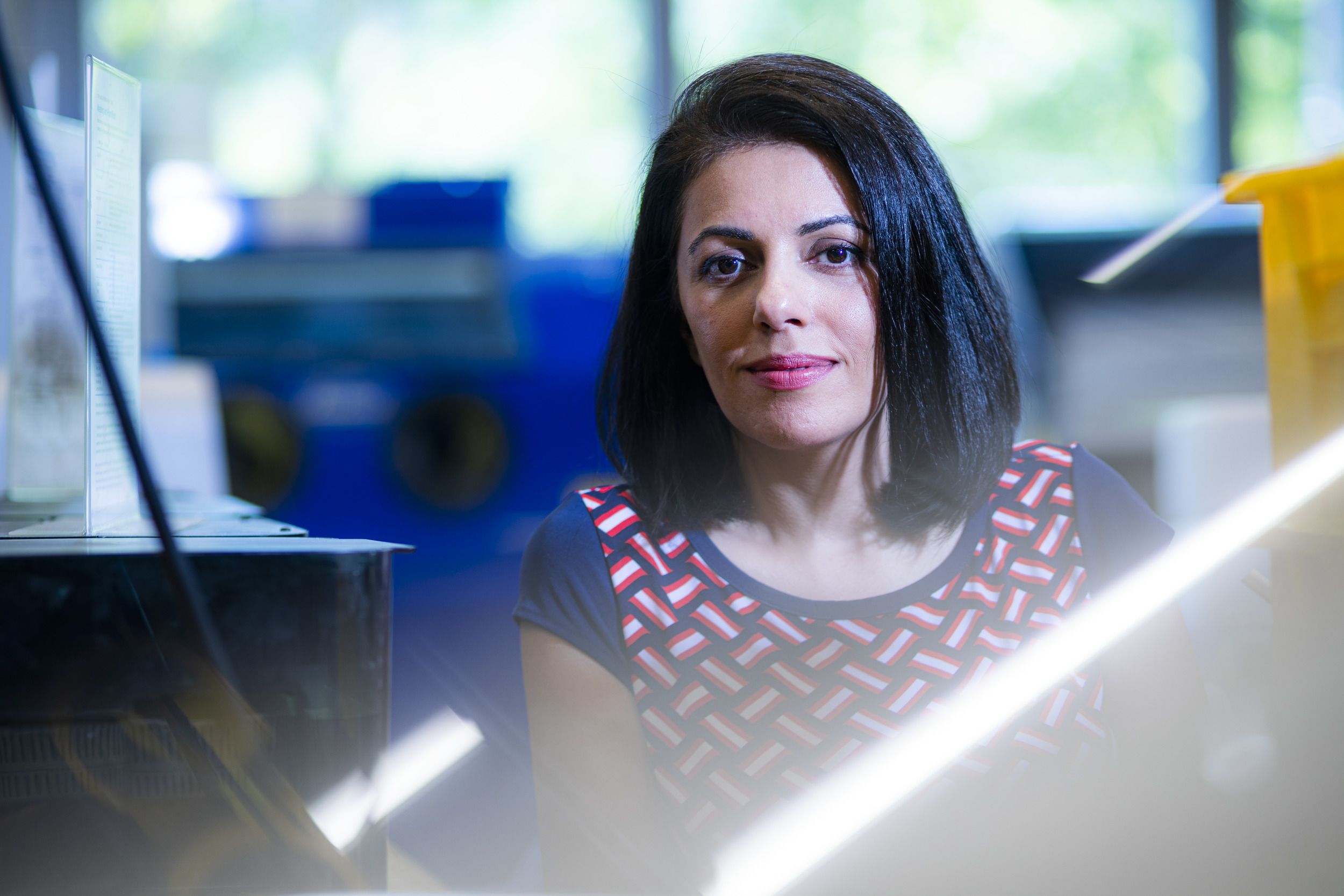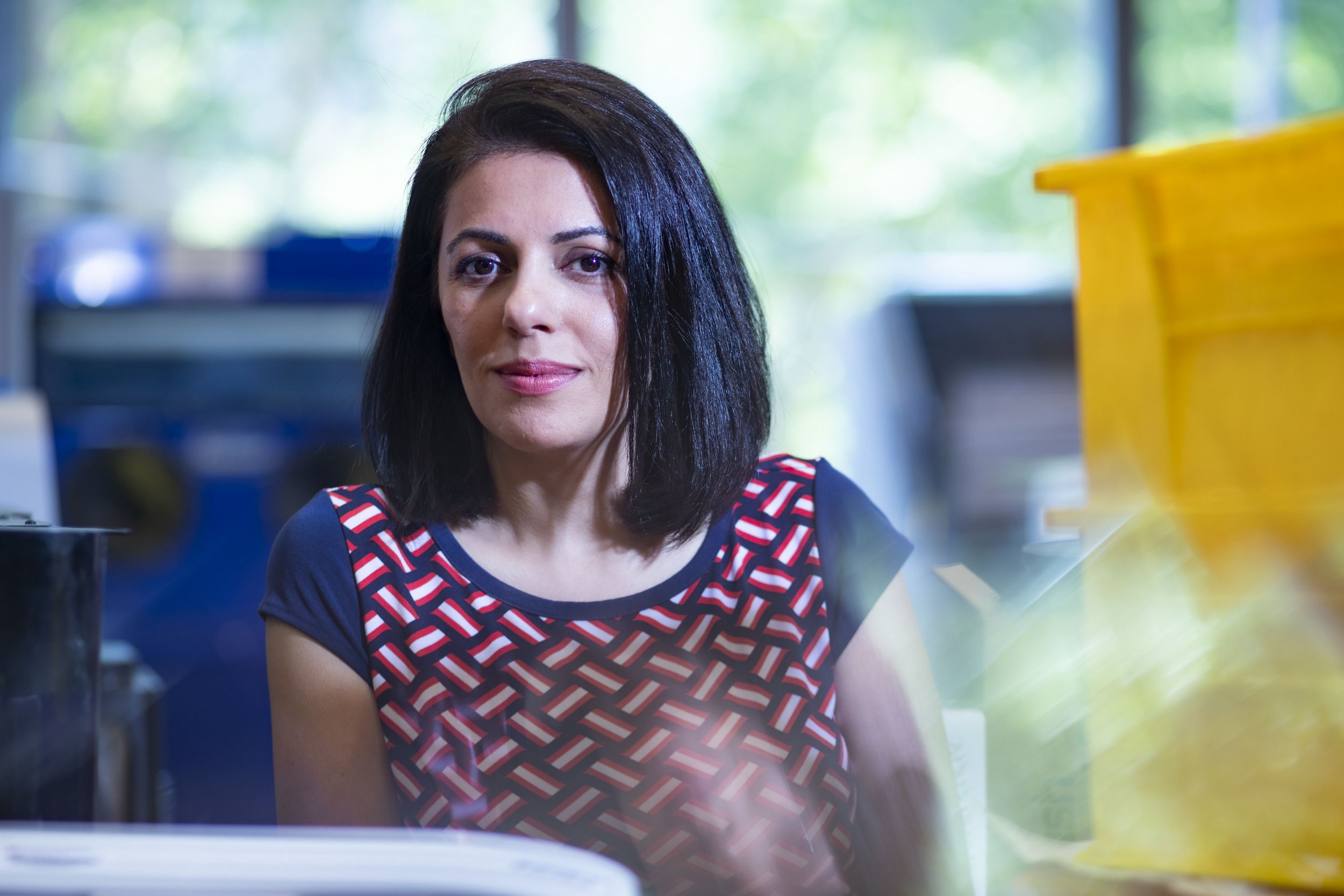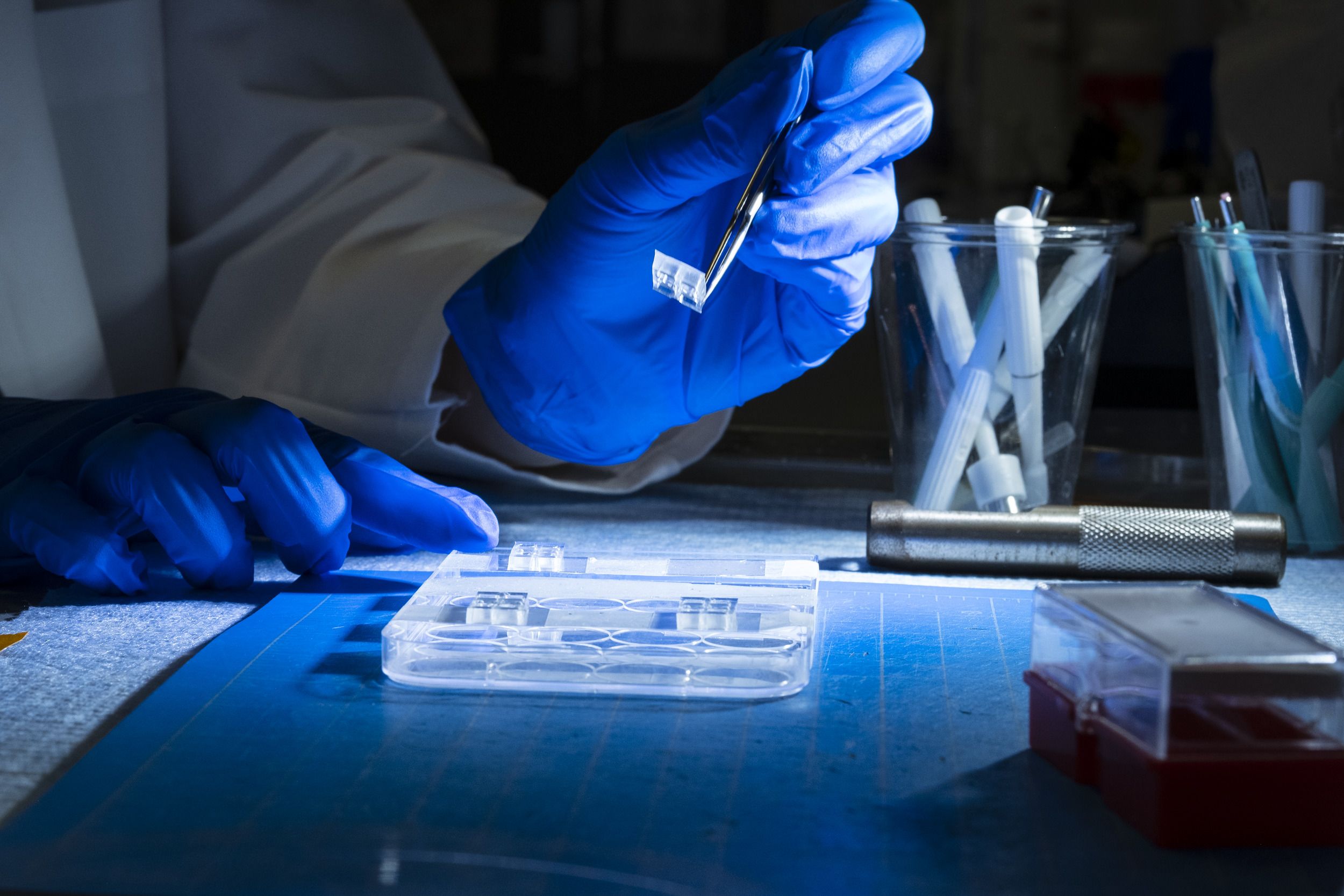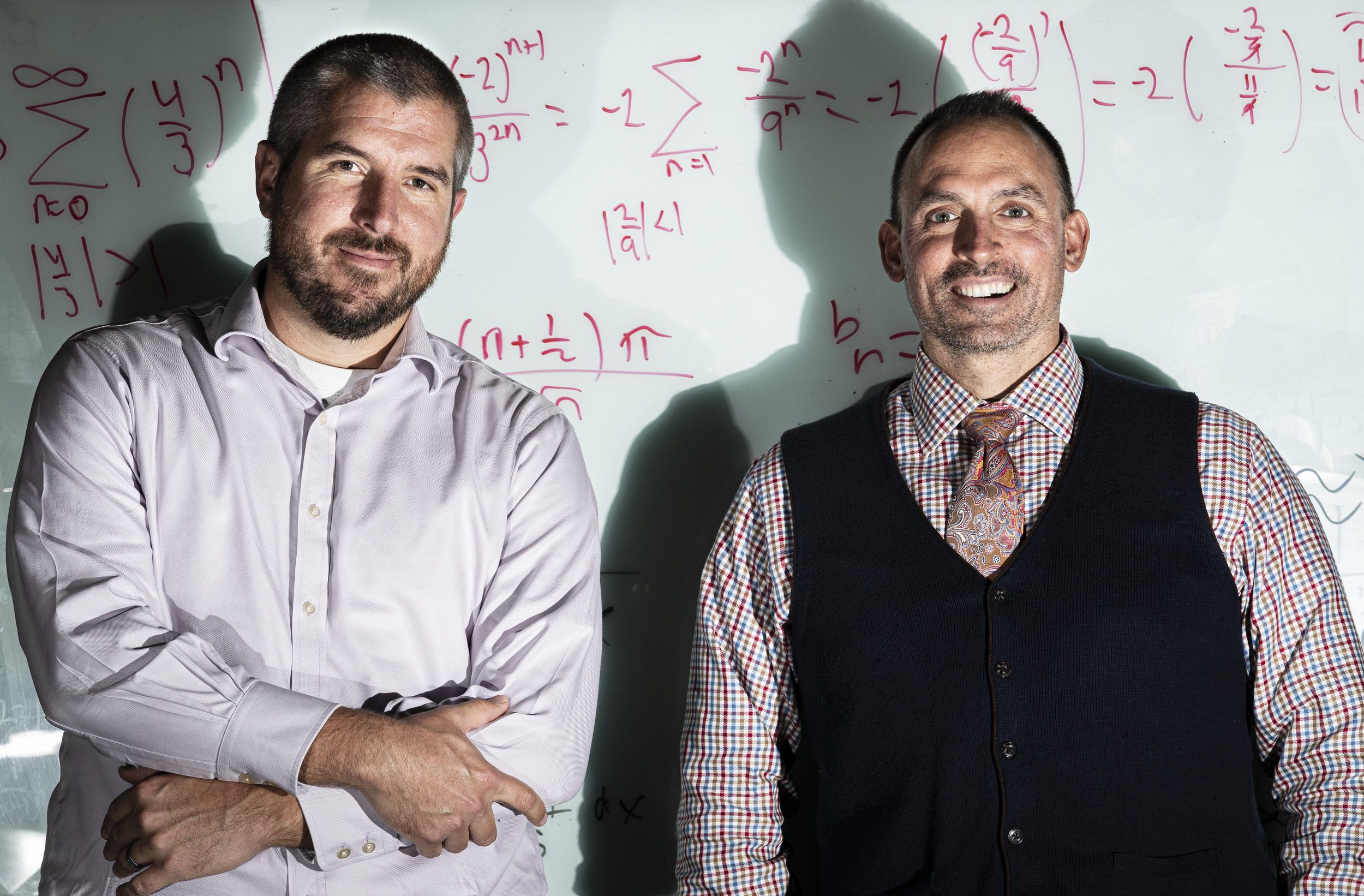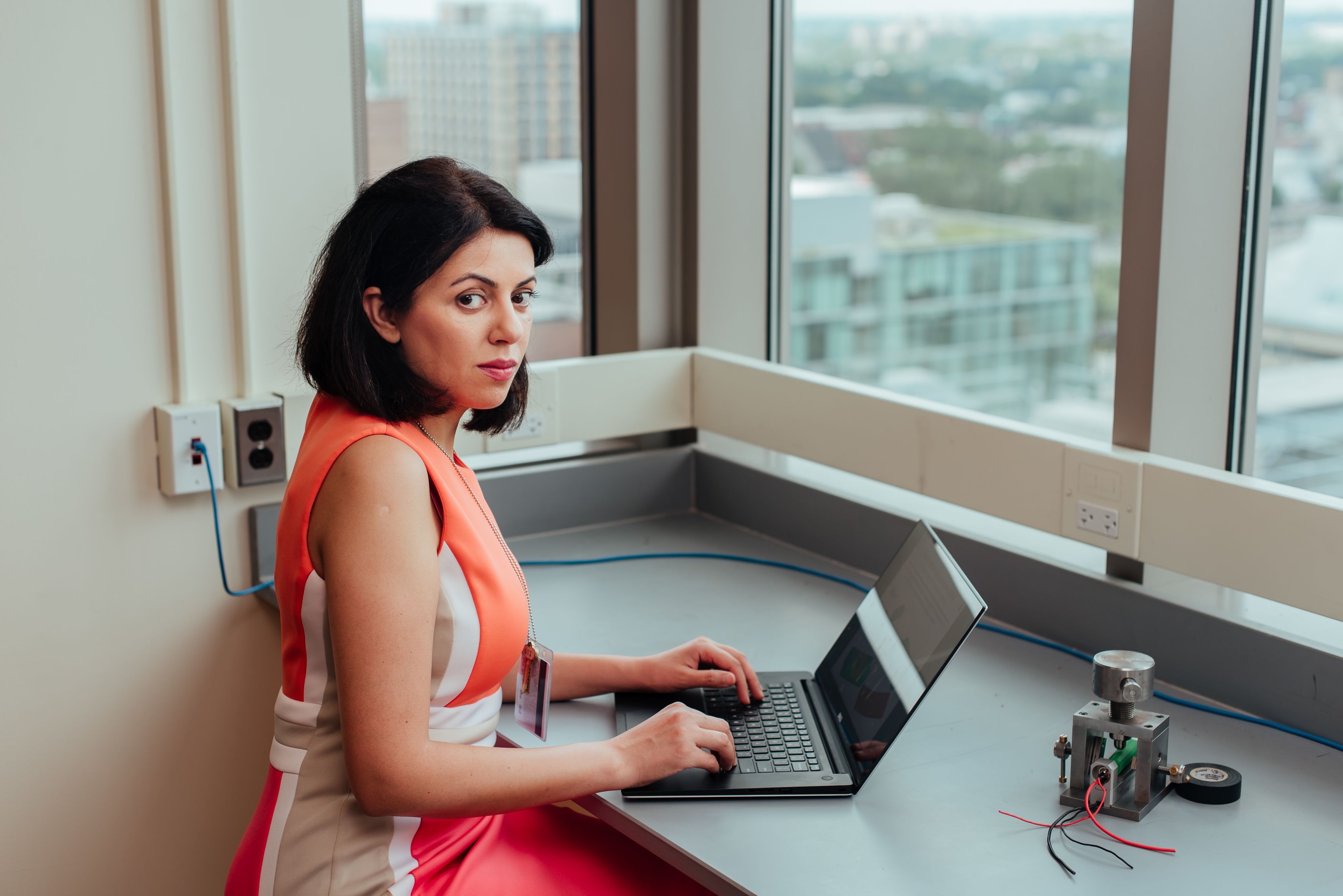A City Built by Engineers.
Engineers create lasting impact on their environment and infrastructure.

You’ve probably heard the phrase “show your work.” Mostly in math class, where teachers want to see how you reached your conclusion—what you did right or where you went wrong. It allows students to learn and grow. For Temple Engineers, it’s the most important part of what we do.
Here, it goes beyond simply showing how we work out a problem (though that’s important, too). Engineering at Temple is where innovation and entrepreneurship meet, and where creativity blooms. Showing our work means anticipating needs and finding the roots of issues in order to make ourselves truly useful. We want to share our work with other colleges by actively engaging with them to solve issues that affect everyone, like clean water and cancer treatment. Our doors are open and—quite literally—transparent, meaning that we encourage curiosity and collaboration, especially as undergraduates. We believe that the earlier you get started, the more time you have to grow.
As engineers, we show our work all over the city and beyond. You’ll see it in parks and buildings, in your car, and on your phone. As an engineer, your future is wide open. As a Temple Engineer, we’ll bring this possibility into focus. Discover what makes the Temple University College of Engineering amazing by reading about just a handful of change-makers that are helping to shape your future.

Meet the Changemakers.
Bioengineering Changemakers
Meet Dario Duran
Bioengineering Department
Fostering an Engineering Community
Dario Duran is a bioengineering student with a concentration in engineering devices. A first-generation college student, he is also the first in his family to pursue engineering. Alongside balancing coursework and research, Duran has created and fostered a network of student support at the College of Engineering.
Originally beginning as a mechanical engineering major, Duran first learned of the bioengineering field when he arrived at Temple. Exploring the bioengineering career pathways and curriculum exposed him to career fields he hadn’t previously considered. Upon learning that he could combine his interest in medicine with engineering, he switched over to bioengineering and never looked back.
The summer before his sophomore year, Duran worked with the College and University to establish Latinos in STEM (LSTO) as a student organization, even expediting the process to officially establish LSTO in the fall of 2023. Serving as the founding member and president, Duran recruited STEM students from across the university and currently leads a group of around 20 active members.
Alongside his e-board, Duran and LSTO host a variety of events including guest speakers, informational sessions, workshops and panels for students to socialize, find support and learn more about potential careers. His vision for LSTO is rooted in helping fellow students avoid making the same mistakes he did when he first started college. As a minority and first-generation college student, he hopes LSTO stays as a support system for fellow Temple engineers to seek guidance through college and their eventual careers.
In addition to his student organization involvement, Duran works in Bioengineering chair - Dr. Anita Singh’s Neural Injury Biomechanics Laboratory assisting in research on neonatal brachial plexus injury. The brachial plexus is a group of nerves that control the shoulder, through the arm to the fingers, and connects to the spinal cord. These nerves can become overstretched and damaged during complicated birthing scenarios. In the lab, Duran completes data analysis, observing specific nerves over different time periods to record how the nerves are recovering. His experience in the lab provides an invaluable opportunity to put the concepts learned in class into practice.
One of his favorite aspects of the bioengineering department is the camaraderie among his peers. With small class sizes, Duran knows every fellow student in his major, making it easy to reach out for help and return the favor by providing his own support when he can. In turn, faculty members take a vested interest in their students, connecting them with opportunities and setting them up for success in their eventual careers.
Duran considers Singh an invaluable mentor in his engineering journey. Through her encouragement, he attended an annual Biomedical Engineering Society (BMES) conference and presented his research poster to fellow attendees, earned a scholarship thanks to her recommendation and through her guidance has gained a broader perspective of his career goals.
After attending the BMES conference, Duran felt an even stronger connection to his bioengineering pursuits. Observing the work of bioengineering professionals and their tangible impact on the lives of patients inspired him to bring his undergraduate research experience to an eventual career in industry where he hopes to work with prosthetics.
Temple at large has provided Duran with a vast network. He connects LSTO with fellow student organizations across the university to connect with peers outside of engineering and has the city of Philadelphia easily accessible for professional opportunities.
While the proximity to home, city-setting and abundance of opportunities drew Duran to Temple, it’s his relationship with his peers and the tight-knit community within the College of Engineering that has transformed him both personally and professionally. He feels he’s grown in all aspects since the start of his engineering journey. Feeling more mature, dedicated and motivated, Duran tackles every challenge with his sights set on a successful future.
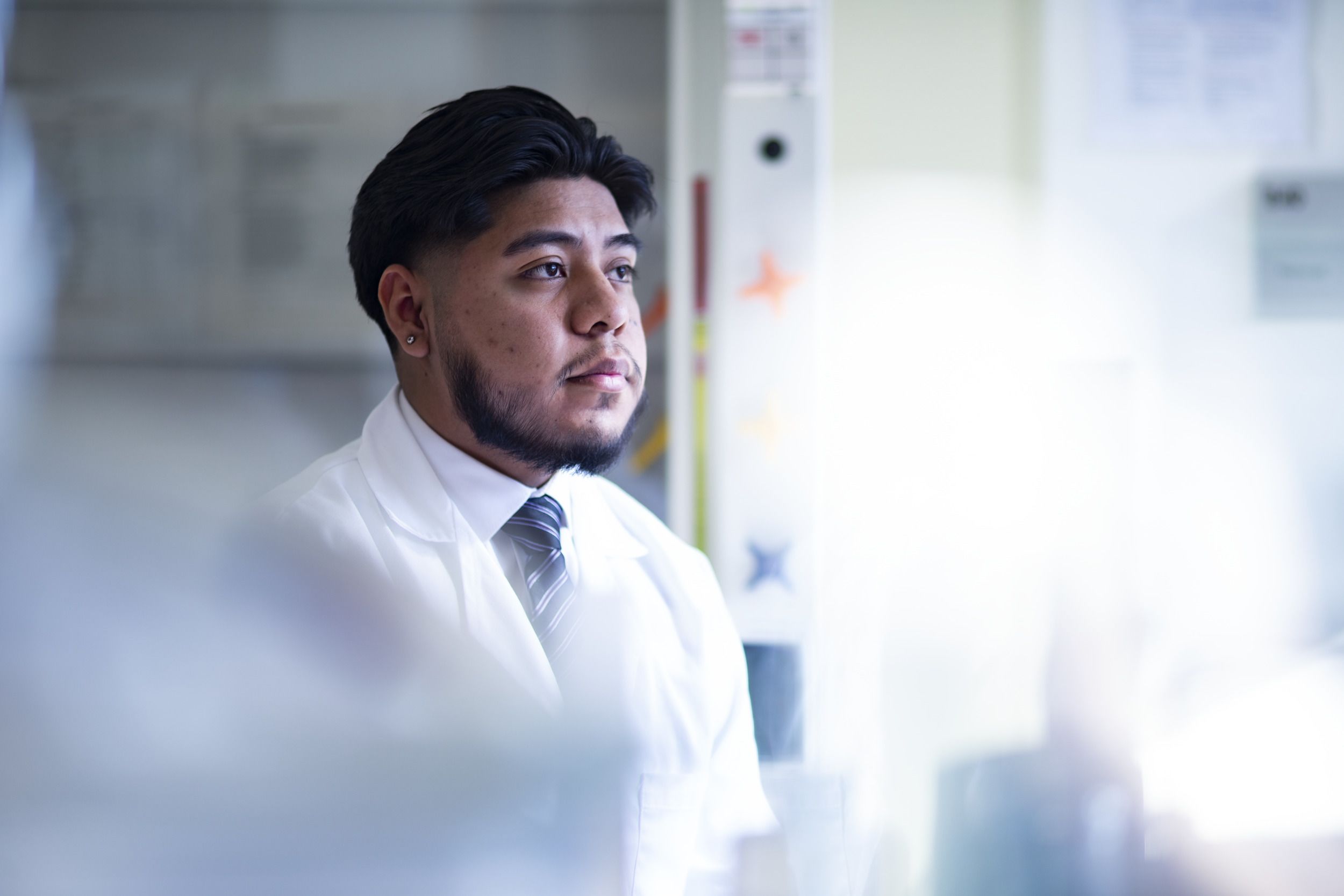
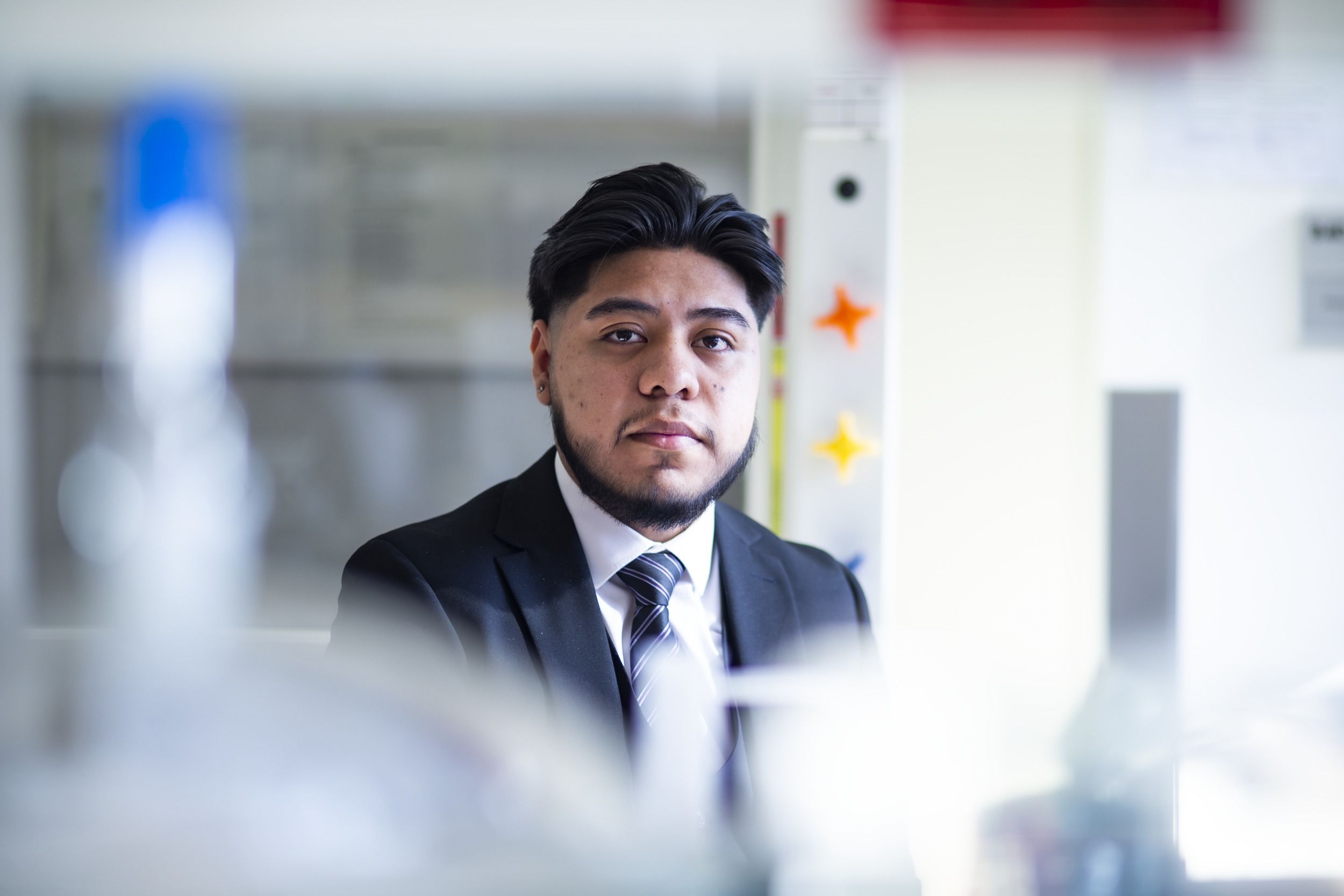
Meet Dr. Anita Singh
Bioengineering Department
Revolutionizing Neonatal Health for a Brighter Future
Dr. Anita Singh is an associate professor in the Bioengineering Department. She also serves as the department chair. In addition to teaching and leading the department, Dr. Singh is the principal investigator of the Neural Injury Biomechanics Laboratory with a research focus on neonatal birthing injuries.
Dr. Singh’s laboratory explores various aspects of neonatal brachial plexus injury that can occur during complicated birthing scenarios. Brachial plexus nerves control from the shoulder, through the arm to the fingers and connects to the spinal cord. The nerves can become overstretched and damaged during a complicated birthing scenario leading to lifelong complications.
Funded by grants from organizations including NSF (National Science Foundation) and NIH (National Institute of Health), the Neural Injury Biomechanics Laboratory works on various projects. Currently, Dr. Singh’s team takes data from simulated injuries in large animal models, collaborates with experts from Shriner's Hospital to translate the animal data findings to a human clinic, and then creates computational mathematical models to simulate similar birthing scenarios. The computational models are then studied and used as a tool in minimizing these birthing injuries.
Dr. Singh is also working towards the widespread use of biofluids to test for injury biomarkers. Currently, patients must wait three to six months to confirm a birthing injury, since some injuries may recover spontaneously. If administered immediately after a complicated birthing scenario, the detection of injury biomarkers would allow for early intervention.
Her passion for research is equaled by her passion for mentoring young engineers. Dr. Singh employs students of all levels in her laboratory. She encourages undergraduate students to use their research opportunities to help determine the career track they want to pursue and allows graduate and post-doctoral students to take a leadership role in the lab. Even if her students opt to pursue a career in industry over research, she believes the experiences they learn in lab will serve them well in any career path.
Alongside mentoring students in the lab, Dr. Singh provides support to bioengineering students and is the faculty advisor to Temple’s student group, the Biomedical Engineering Society. She also coordinates research internships and hosts summer program interns.
In the classroom, Dr. Singh centers her teaching around a project and problem-based learning approach for hands-on experience. Staying up to date on classroom and teaching innovations as an educator is crucial, which is why she is constantly developing innovative tools to enhance the student learning experience. Her current innovation focus is VR (virtual reality).
Using VR in the classroom would allow students to virtually experience work in a research lab before ever physically setting foot in one. These simulation labs can create an environment where students can work together alongside healthcare professionals. VR research experience could boost student confidence and push them towards pursuing valuable in-person research experiences.
Students are at the center of Dr. Singh’s work. She strives to prepare and guide young engineers to achieve their career goals and works tirelessly to enhance women representation in STEM.
With over 13 years of teaching experience and over two decades in the bioengineering field, an NSF Career Award, and Chair of the 2022 Bio Medical Engineering Society Annual Meeting, Dr. Singh brings a plethora of experience to the College of Engineering.
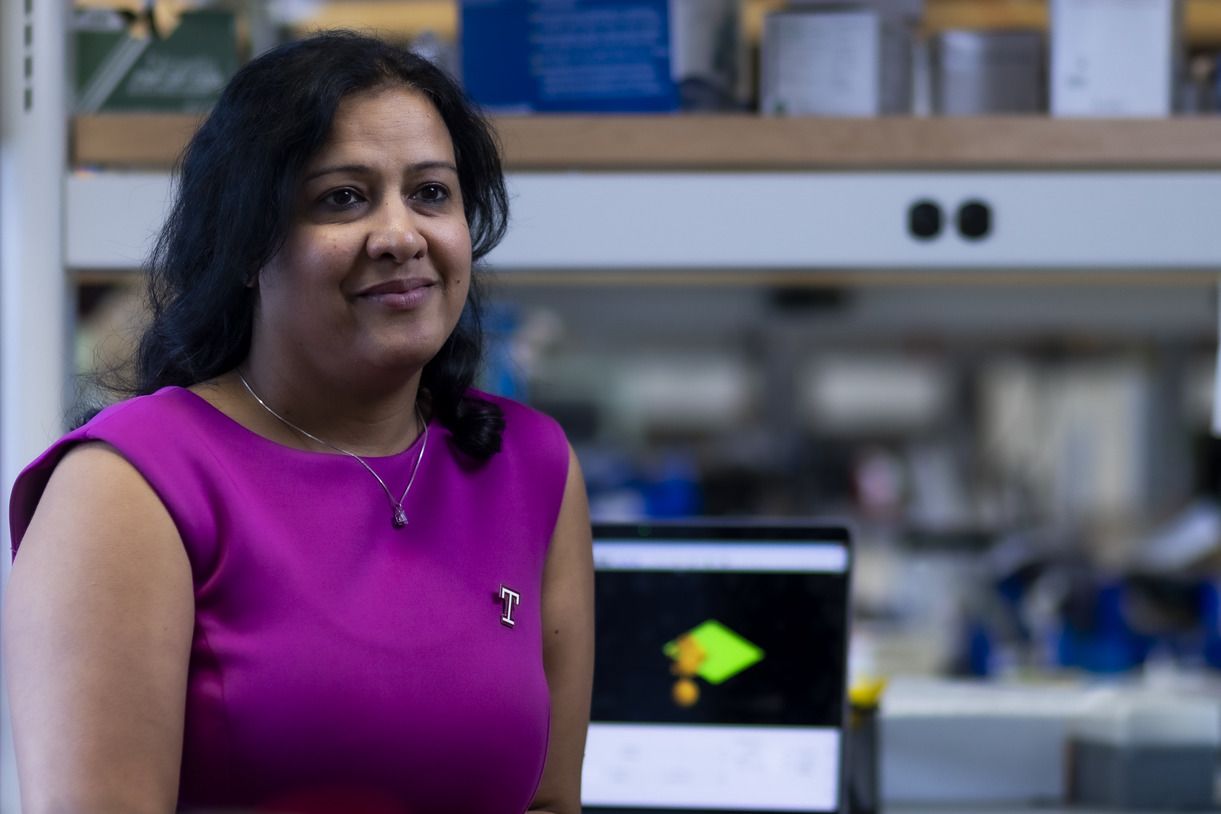
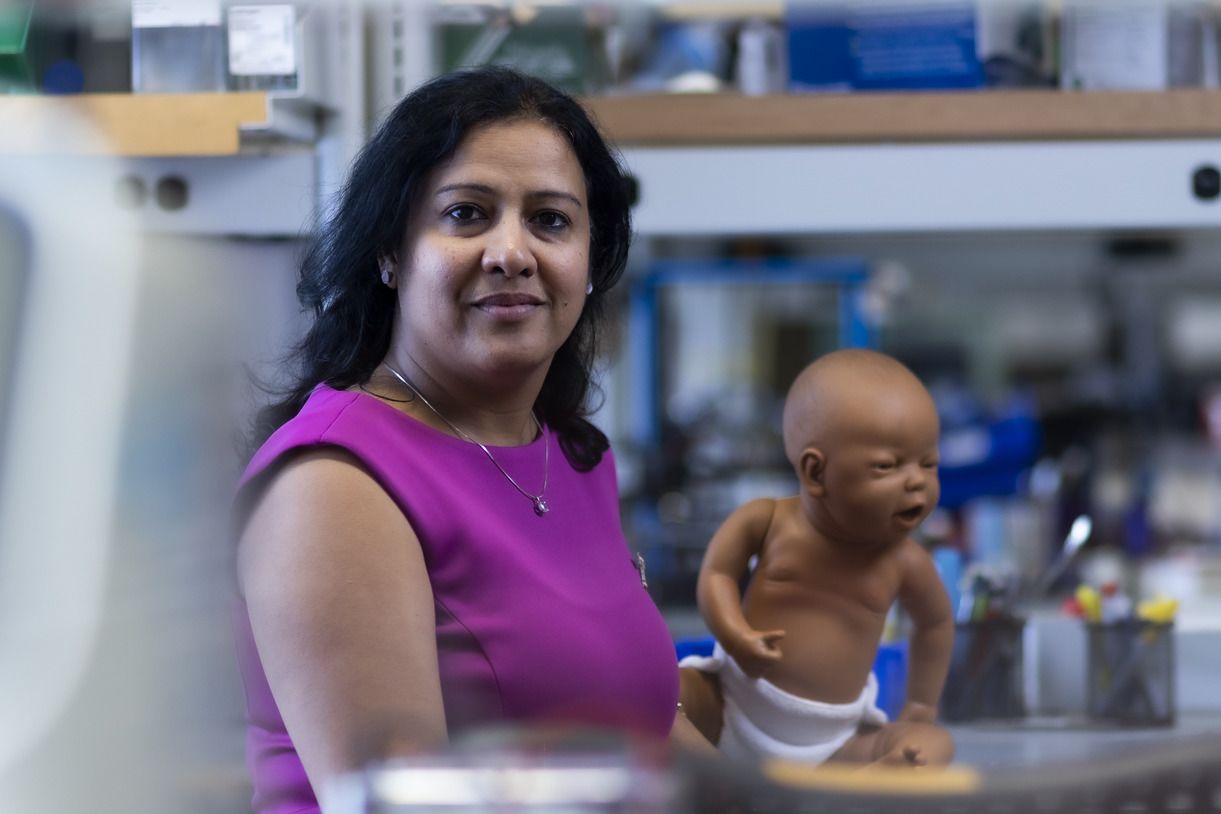
Meet Dr. Karin Wang
Bioengineering Department
Cellular-Level Research for Large Scale Impact
Dr. Karin Wang is an Assistant Professor of Bioengineering, covering three courses at the College of Engineering in addition to serving as Principal Investigator of the interdisciplinary Cell and Matrix Mechanobiology Lab.
With a mechanobiology focus, Dr. Wang’s research includes principles from tissue engineering, biomaterials science, soft matter physics, and cell biology. Her lab uses interdisciplinary approaches to understand how physical forces regulate cell-matrix interactions, with a particular focus on fibronectin structure-function and its impact in wound repair, fibrosis, and cancer metastasis.
One of Dr. Wang’s research areas, some of which have been published in Biomaterials in 2015 and Matrix Biology in 2017, focuses on the interaction between breast cancer paracrine-signaling factors, nearby cells, and fibronectin matrices. As breast cancer cells release paracrine-signaling factors, nearby stromal cells sense these factors from the tumor, change phenotype, and alter how they assemble fibronectin matrices to aid in cancer cell escape from the primary tumor. Dr. Wang and her team created in vitro models of this process to investigate how tumors recruit nearby cells to assemble an altered fibronectin matrix to drive tumor progression and metastasis. Dr. Wang’s fundamental research on how tumor impacted cells assemble fibronectin lays the groundwork for future cancer research and potential treatment options.
Dr. Wang continues to actively research this topic, as well as how fibronectin isoforms regulate wound repair and fibrosis, within the Cell and Matrix Mechanobiology Lab at the College of Engineering. Dr. Wang hosts multiple graduate and undergraduate students in her lab, all working on various facets of these research areas, ranging from fabricating microscope compatible strain devices, to bioengineering cell-derived matrices and fibronectin probes, to evaluating cell migration dynamics from time-lapse microscopy images.
Mentoring students in their pursuit of STEM is incredibly important to Dr. Wang. As a first-generation student that received her bachelor's degrees from a public university that laid the foundation for her to pursue a doctoral degree, she understands the barriers that exist in STEM and seeks to mentor students in pursuit of their goals. Dr. Wang recently hosted a group of high school students in her lab as part of a summer internship program with Heights Philadelphia, providing an opportunity for local students to gain insight into what their future in the STEM field could look like. Dr. Wang has mentored dozens of individuals ranging from high school to doctoral graduate students.
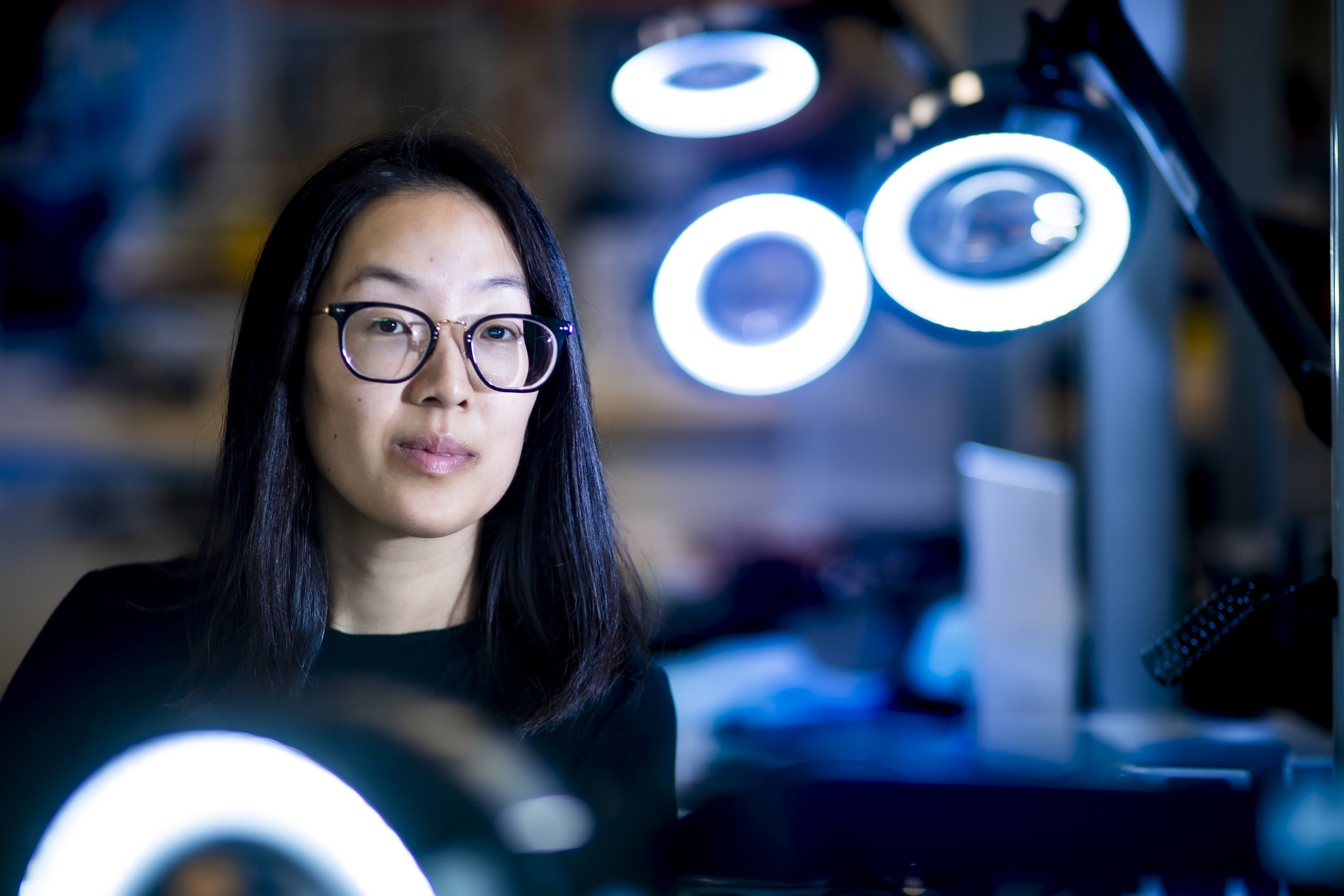
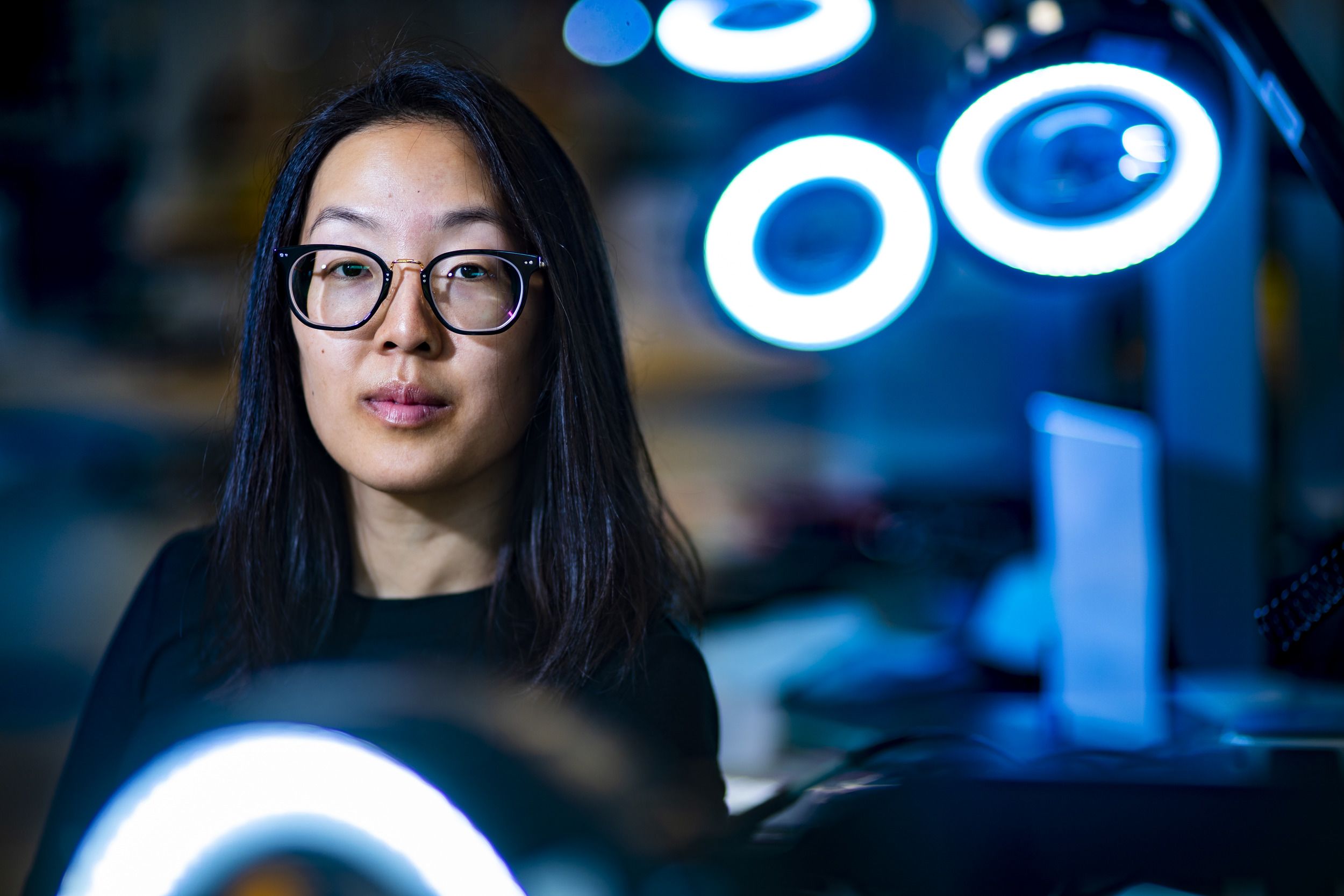
Civil and Environmental Engineering Changemakers
Meet Tanishka Shah
Civil and Environmental Engineering Department
Engineering for Communities
Tanishka Shah is a student in the civil and environmental engineering department. Fueled by a passion to improve worldwide water quality, Shah’s gotten a jump start on a career in environmental engineering with her active involvement at the College of Engineering.
She made the leap to Temple as an international student, drawn to the university’s diverse student body. The wide variety of cultures, backgrounds and available majors provided a plethora of opportunities to make interdisciplinary connections.
While inspired to pursue engineering by her father, a polymer engineer, Shah found herself more drawn to the civil and environmental aspects of engineering. Knowing this interest, former high school classmates encouraged Shah to join the international organization Engineers Without Borders (EWB). Attending Temple Fest, the university's annual student organization fair at the start of the semester, she sought out Temple's chapter of EWB to join and became a member of the organization before her first classes even began.
Demonstrating leadership and initiative early on, Shah was appointed as project lead in the spring semester of her freshman year for a new international project in EWB. The project, still in progress, is focused on providing sustainable sanitation to a village in Ecuador, with a goal to build 60 latrines. Shah has accompanied EWB on both trips to Ecuador for data collection and the start of construction.
With her continued involvement, Shah became president of the organization her junior year where she took on a larger leadership position and had various roles including planning a gala and a regional conference to connect with other student EWB chapters.
Her experience in EWB went hand-in-hand with her coursework. The group’s environmental data collection in Ecuador, like water and soil testing, allowed Shah to link her course learnings to the international project. In turn, when it came time to take a water quality course, Shah already had experience with many of the testing parameters discussed in class, such as pH and coliform testing. Her experience with EWB left her well-prepared for the material ahead and well-versed in the real-world application.
While EWB provides Shah with an avenue to explore the technical aspects of her future career, her involvement with Temple Robotics as a project manager brought her out of her comfort zone. While the team prepared for the NASA Lunabotics competition, Shah managed coordination between the mechanical and electrical teams, ensuring open communication, proper documentation and even planning some of the travel arrangements for the competition.
Her role as project manager allowed Shah to hone her leadership and communication skills as well as learn more about mechanical design. The robotics team is comprised of engineers from every discipline, and working with them gave her a more holistic view engineering. She now approaches design solutions with a greater understanding of mechanical systems including the machines and costs that are involved outside of just environmental factors.
Alongside her work within her student organizations, Shah works as a research assistant with Dr. Gangadhar Andaluri in the Thermal Technologies Laboratory. She began with microplastics research and was listed as a co-author on a published research report on microplastics in the Delaware River. Continuing her work with Andaluri, Shah moved into researching PFAS (per- and poly fluoroalkyl substances), or forever chemicals, studying how PFAS are introduced into the water supply and identifying potential methods for removal.
Once she graduates with her undergraduate degree, Shah will pursue her master's in environmental engineering as part of the plus one program, allowing her to earn both a bachelor’s and a master’s degree in five years. She hopes to translate her research experience into a career in industry. Passionate about improving water quality, her long-term goal is to start her own consultancy business with a focus on sustainable design and collaborating with communities to meet their design needs.
Staying involved on Temple’s campus and at the College of Engineering enhanced Shah’s student experience in ways she couldn’t imagine. With a student body focused on collaboration over competition and supportive faculty that continually broaden her perspective, she looks forward to an eventual career in bettering communities.
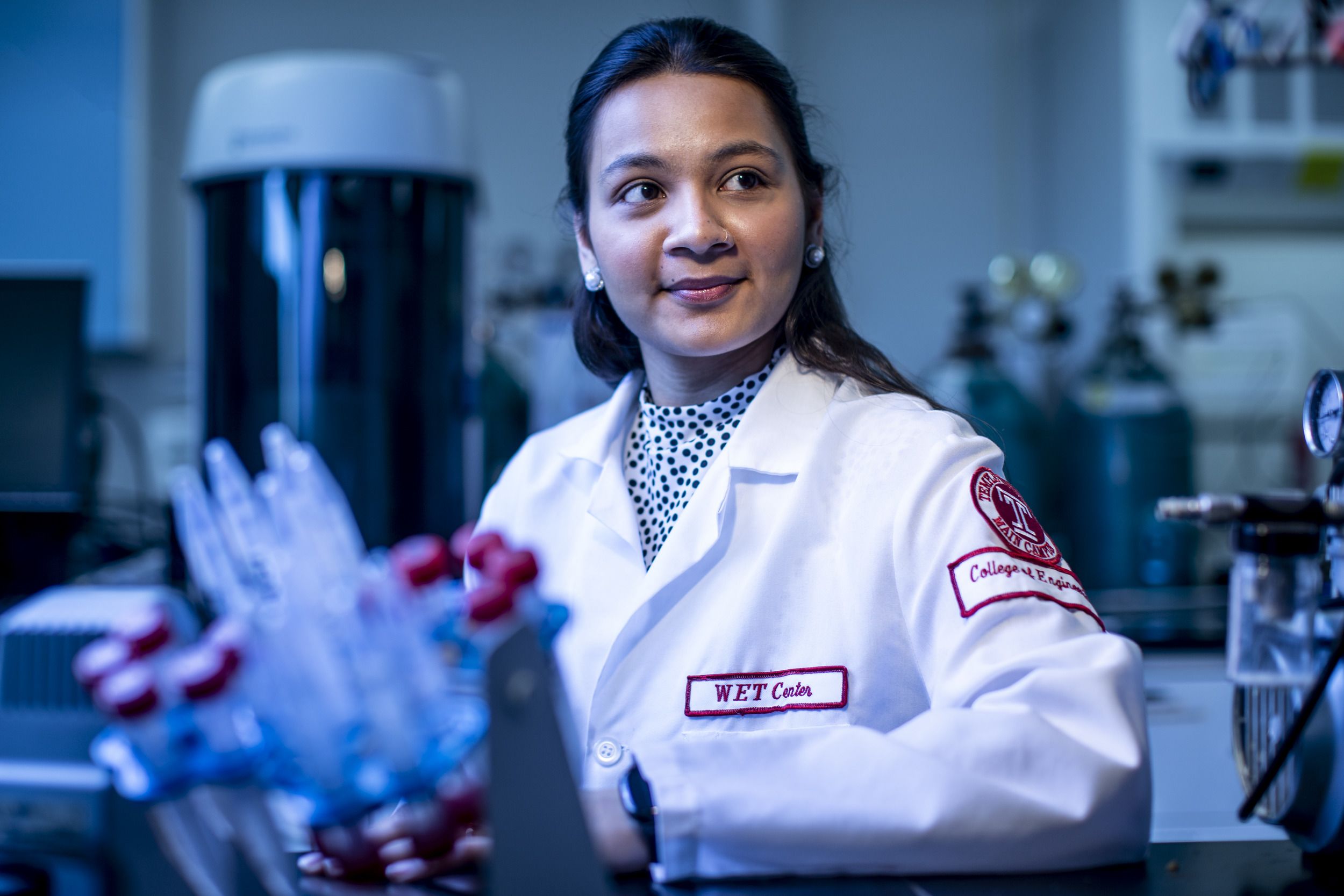
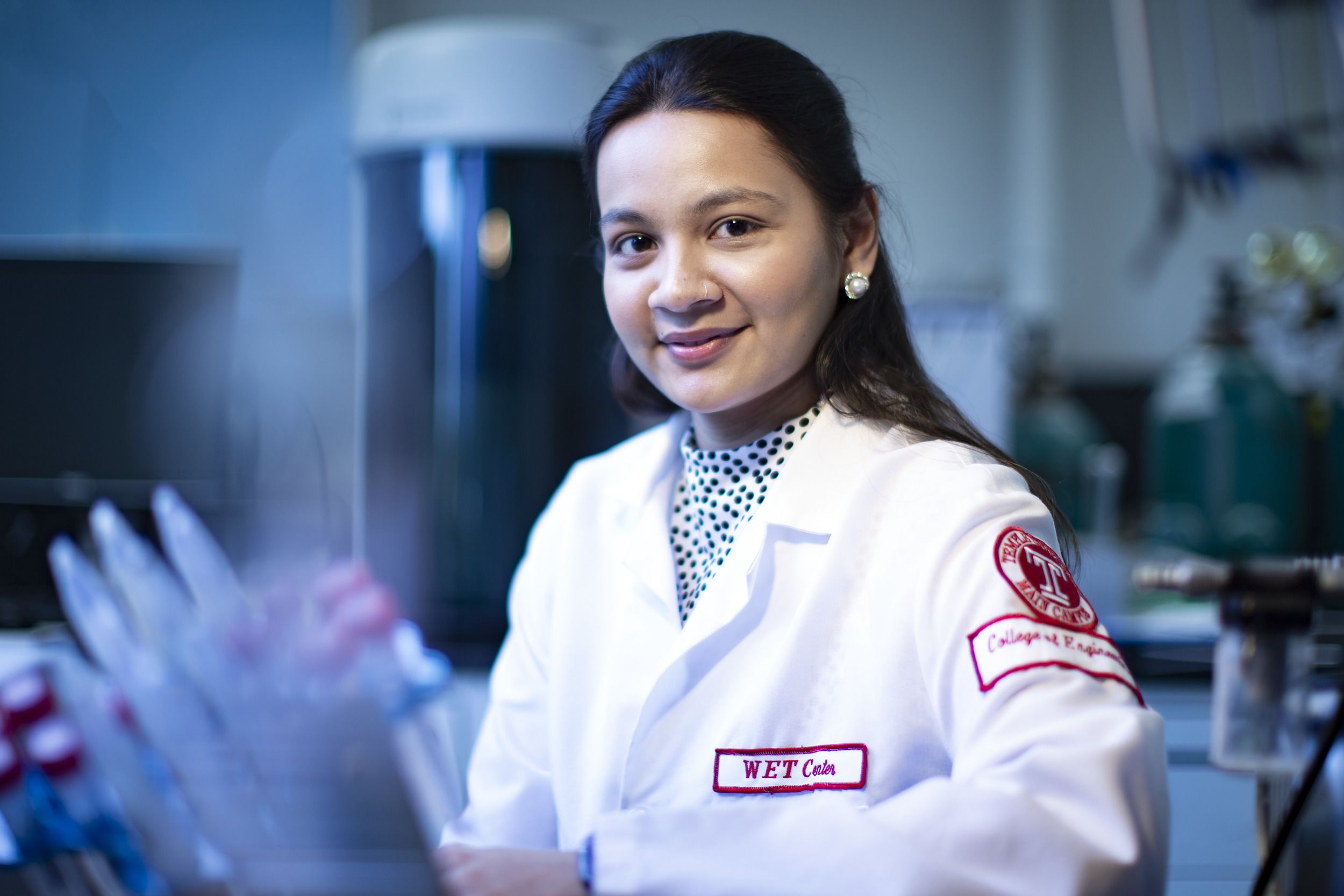
Meet Dr. Gangadhar Andaluri
Civil and Environmental Engineering Department
Eliminating Water Pollution for a Cleaner Future
Dr. Gangadhar Andaluri is an Assistant Professor in the Civil and Environmental Engineering department in the College of Engineering at Temple University. In addition to teaching, he leads the Thermal Technologies Laboratory and serves as the faculty advisor for the Society of Environmental Engineers and Scientists (SEES).
Dr. Andaluri’s research focuses on water and wastewater; how contaminants are being introduced into the freshwater supply, the effects that chemicals can have on freshwater, and treatment methods for contaminated water. The contaminants that he focuses on are PFAS (per- and poly fluoroalkyl substances), or forever chemicals, microplastics, and antibiotics. All these contaminants enter bodies of water in different ways and have different effects on water quality. The overall goal of Andaluri’s research is to gain an understanding of water pollution as well as developing water treatment methods to remove these chemicals.
In addition to researching how PFAS get into and are transported through the water supply, Andaluri takes water samples to determine the levels of PFAS in certain bodies of water and completes assessments to determine how much risk is present if someone is exposed to the level of PFAS in bodies of water. Andaluri then experiments with water treatment processes such as supercritical wet oxidation which involves heating a water sample under pressure to remove chemicals from the water.
Microplastics is also a main portion of Andaluri’s research. As plastics take a long time to break down, plastic products often become trapped in the water system and break apart into smaller pieces, becoming microplastics. This can come from plastic bags, water bottles, and other plastic materials that make their way into the water system.
The majority of Andaluri’s research takes place in the Delaware River. Recently, his team submitted their research report on microplastics in the Delaware River to the Delaware Basin Commission. After reviewing the data, the Commission organized a cleanup event. Around 50-60 contractor bags of littered plastic were collected and removed from the areas surrounding the river. Organized cleanups are a crucial part of ensuring that plastics don’t break down into microplastics in water bodies. Dr. Andaluri also completes local cleanups with Temple’s SEES club.
Dr. Andaluri will soon begin work on another body of water in Philadelphia, the Schuylkill River. He recently received a grant from the Pennsylvania Water Resources Research Center to conduct research on the concentration of PFAS in the Schuylkill. This will be his first project in a freshwater source.
Having earned his PhD and working as a senior lab manager and postdoctoral fellow at the College of Engineering before becoming a professor, Andaluri is heavily invested in the success of Temple students. Dr. Andaluri also employs undergraduate students in his lab, providing them with hands-on experience. With his teaching methods he believes in laying the foundation for lifelong learning and strives to help students not just learn material but foster critical thinking skills that will serve them far beyond the classroom.
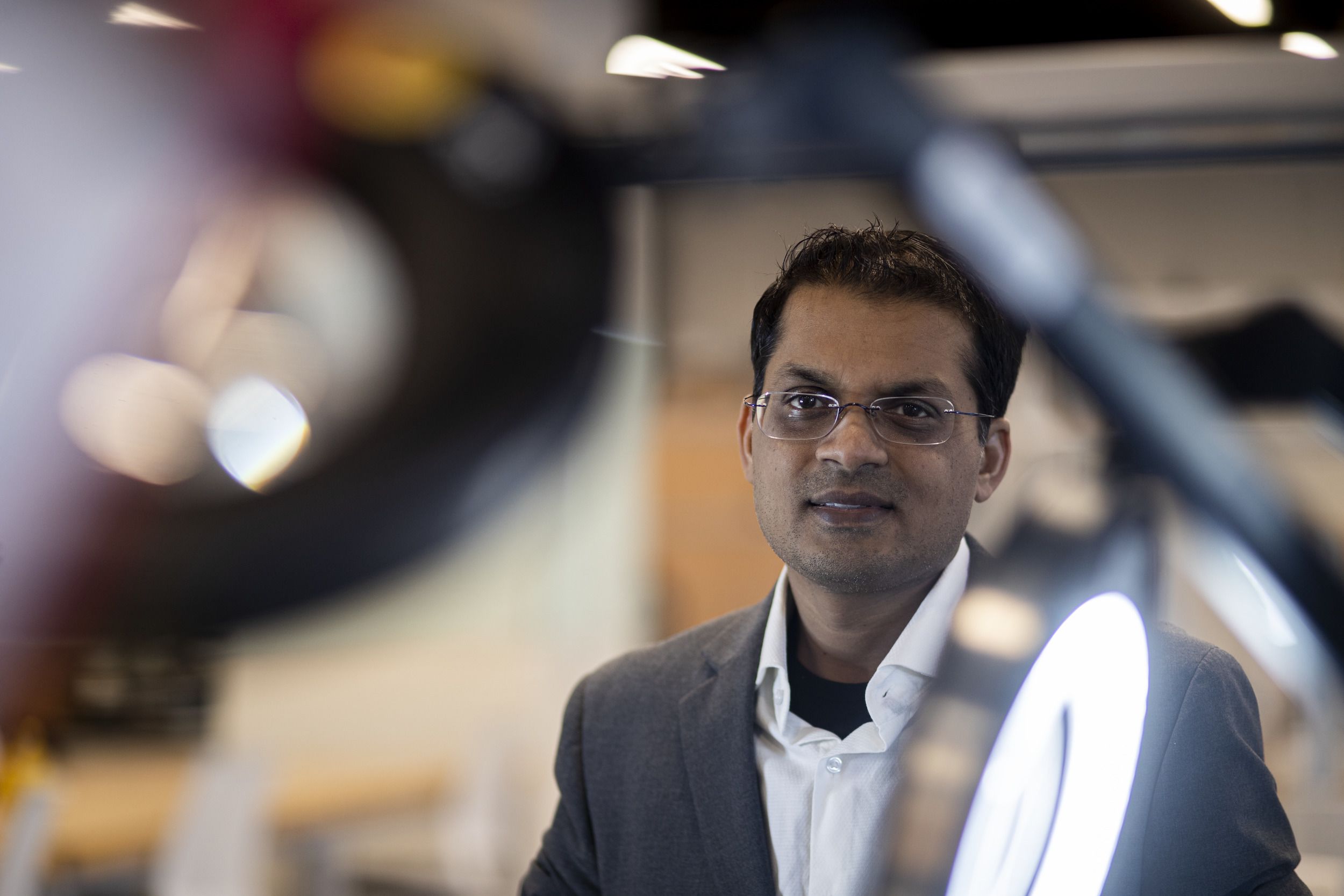
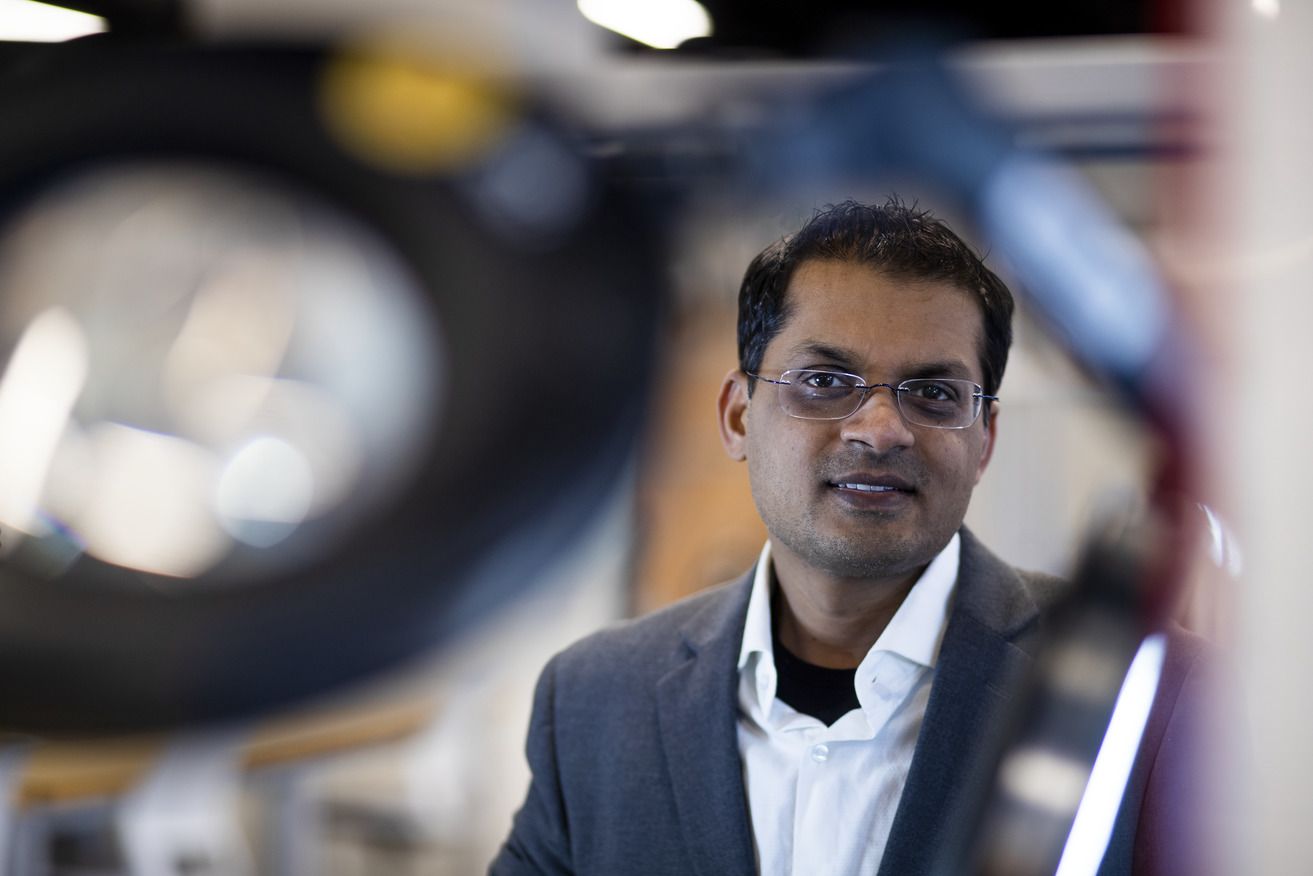
Electrical and Computer Engineering Changemakers
Meet Dylan Boles
Electrical and Computer Engineering Department
Programming his Own Path
Dylan Boles is an electrical engineering student with a concentration in computer engineering. The child of two mechanical engineers, he began his time at the College of Engineering the same, but his interest in software and programming led him away from his family’s specialty to electrical engineering.
A deep sense of curiosity keeps Boles engaged in all things engineering, both in and out of the classroom. Two of his favorite courses, Engineering Computation II and Introduction to Machine Learning and Pattern Recognition, allowed him to take the foundational knowledge he learned in his early engineering classes and apply it to functional projects.
Boles was so fascinated by in-class projects that he decided to pursue new ones outside of school, further expanding upon concepts from class. Some of his projects include the development of a chess application, blackjack and other card games, as well as a task manager. Boles appreciates the tangible aspect of creating an application, often enthralled by the way a single line of code can completely transform a project.
His passion for electrical engineering translated easily to his role as a teaching assistant for Engineering Computation I. Hesitant at first, Boles challenged himself by assuming a teaching role for the first time, fielding questions from fellow students and helping them work through problems. Seeing the growth and progress of students throughout the semester provided him with a sense of fulfillment.
Opportunities such as the teaching assistant role, the guidance of electrical engineering faculty, and support from fellow classmates are all things that keep him engaged at the College of Engineering. However, the collaborative and welcoming environment wasn’t a surprise when he first arrived at campus; being a Temple Owl is a family affair for Boles.
His late grandfather, John R. Boles, served as the Temple men’s soccer coach for over two decades and was inducted into the Temple University Athletics Hall of Fame. Alongside several other family members who attended the university, including his parents who met there as students, Temple was always top-of-mind for Boles.
On top of the family ties, Temple is close to home for Boles, allowing him to be a commuter student. Commuting enables him to pursue his other engineering passion – creating automotive content.
Boles posts videos of building and repairing cars with his friends and covering a wide variety of automotive topics. This allows Boles to stay close to engineering without oversaturating his interest in programming and software. He also occasionally brings his car repair talents to the College of Engineering, attending a few Temple Formula Racing meetings to assist with the building of their formula race car.
Boles finds that his engineering coursework, software projects and car building endeavors, while technically different, have provided him with unique skills that can be applied to each interest. Balancing college coursework helps Boles with his persistence and problem-solving skills, which come in handy when working on his software and car projects.
Since his start at the College of Engineering, Boles has noticed a huge growth in his engineering skills. As he approaches graduation, he sees several avenues for his multiple engineering passions.
Dependent on its continued success, he’s considered expanding his content creation from being car-focused to sharing his love of software development and showcasing his projects there. Another dream is to work in the software industry, honing his skills to eventually begin his own startup.
Boles’ natural curiosity and passion for creativity has laid the foundation for his own unique path in engineering.
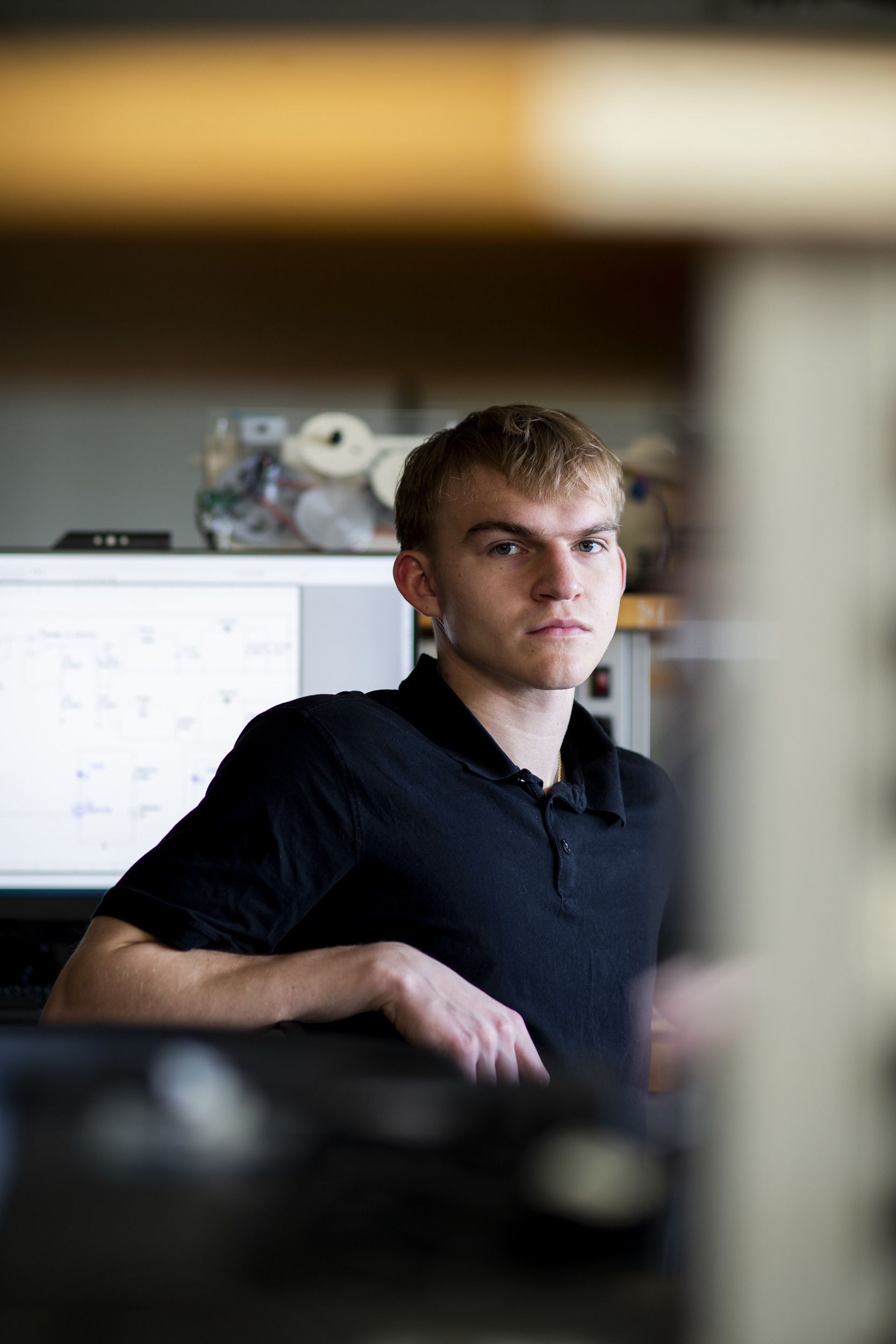
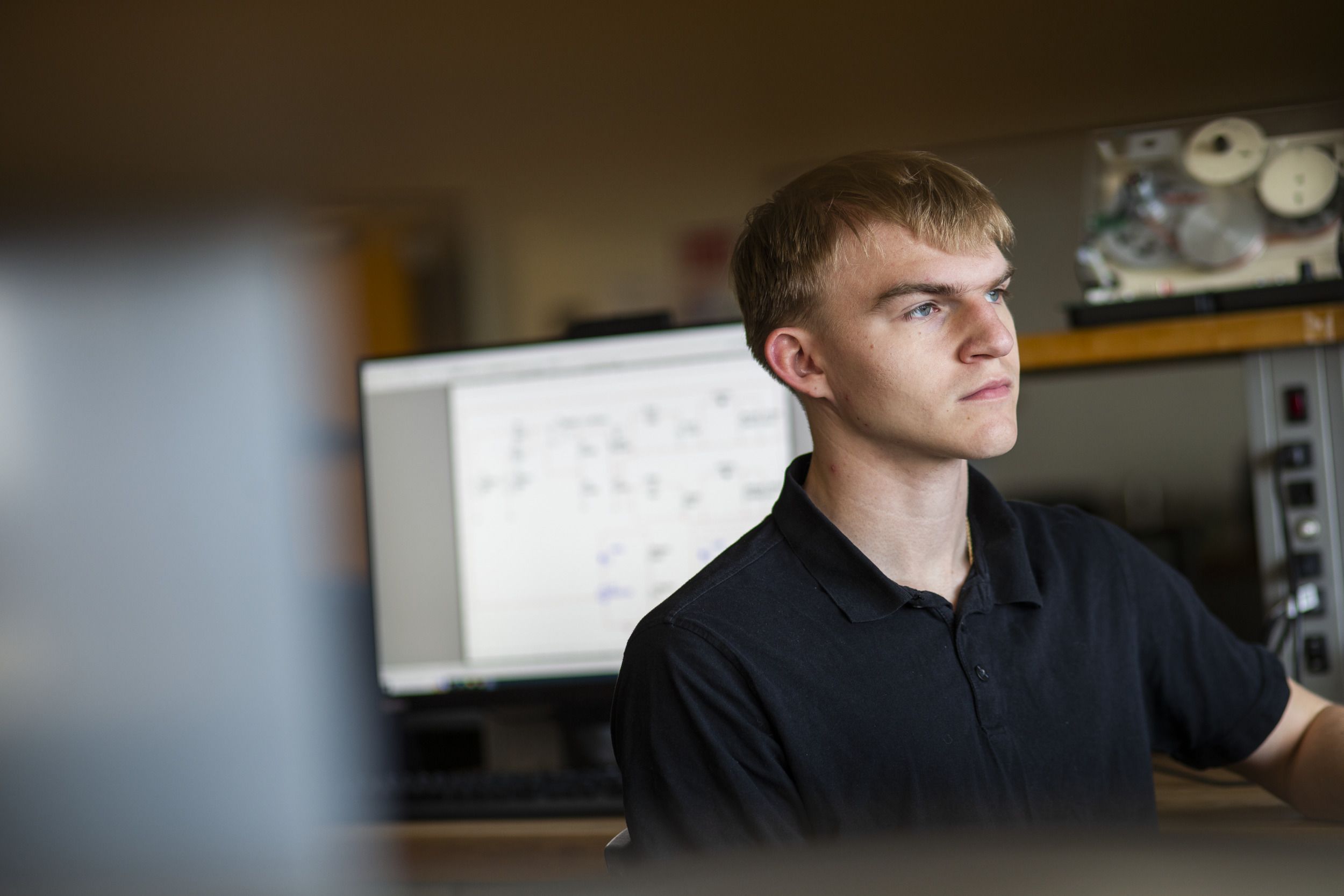
Meet Dr. Iyad Obeid
Electrical and Computer Engineering Department
Machine Learning for the Healthcare System
Dr. Iyad Obeid is an associate professor of Electrical and Computer Engineering. In addition to teaching, Dr. Obeid conducts research with a focus on neural and biomedical system processing. Additionally, he serves as Temple’s university-wide faculty liaison for NSF’s Innovation Corps (I-Corps), promoting entrepreneurship in the STEM fields.
Dr. Obeid’s current research project, with fellow College of Engineering faculty member Dr. Joseph Picone, focuses on training artificial intelligence (AI) for pathology, specifically the detection of breast cancer cells. The team teaches AI to flag the presence of breast cancer cells through the identification of patterns.
Dr. Obeid’s lab introduces AI to existing pathology images with and without breast cancer cells present. The pathology report images are comprised of billions of pixels. The team teaches AI which pixels are important, highlighting the pixels that make up breast cancer cells. Over time, AI will identify and recognize the pattern and gain the ability to flag the potential presence of breast cancer cells.
Alongside machine learning, the main goal of Dr. Obeid’s project is quicker medical intervention for the patient. Currently, reading and processing pathology reports takes a significant amount of time due to volume. Implementing a trained AI into this process would allow the AI to flag reports with breast cancer cells present and bump them up for a pathologist to review. Quicker detection allows medical professionals to develop and implement a treatment plan sooner, potentially saving lives.
Recently funded by the Pennsylvania Breast Cancer Coalition, Dr. Obeid and his team are working on this project with pathologists at Temple Hospital and Fox Chase Cancer Center, meeting several times a year to ensure the project will practically meet the needs of practicing pathologists. Additionally, pathologists teach Dr. Obeid’s student workers on how to label pathology slides to train the AI.
Student participation is crucial to the success of Dr. Obeid’s research projects. He and Dr. Picone currently employ 30 undergraduate and five graduate students to work on their breast cancer research project. They ensure that students contribute to their projects in meaningful ways and have a true impact on the result.
While in-class instruction is imperative for a strong foundation in engineering, Dr. Obeid finds the true purpose of college can be found in hands-on experiences outside of the classroom. Completing projects and participating in research labs allow students to gain experience and impact their field of study before they graduate.
As Dr. Obeid finds his own research as a cross between the machine learning field and healthcare, in his role as Faculty Liaison for I-Corps he helps students across the university develop the skills and pursue funding to take their products to market. Having received an I-Corps grant earlier in his career, Dr. Obeid guides students looking to pursue the same path and connects them with resources to help.
During his 18 years at the College of Engineering, Dr. Obeid received the Lindback Distinguished Teaching Award and an NSF CAREER Award. Combining his love of research and teaching students allows Dr. Obeid to pursue his own passions while guiding students towards theirs.
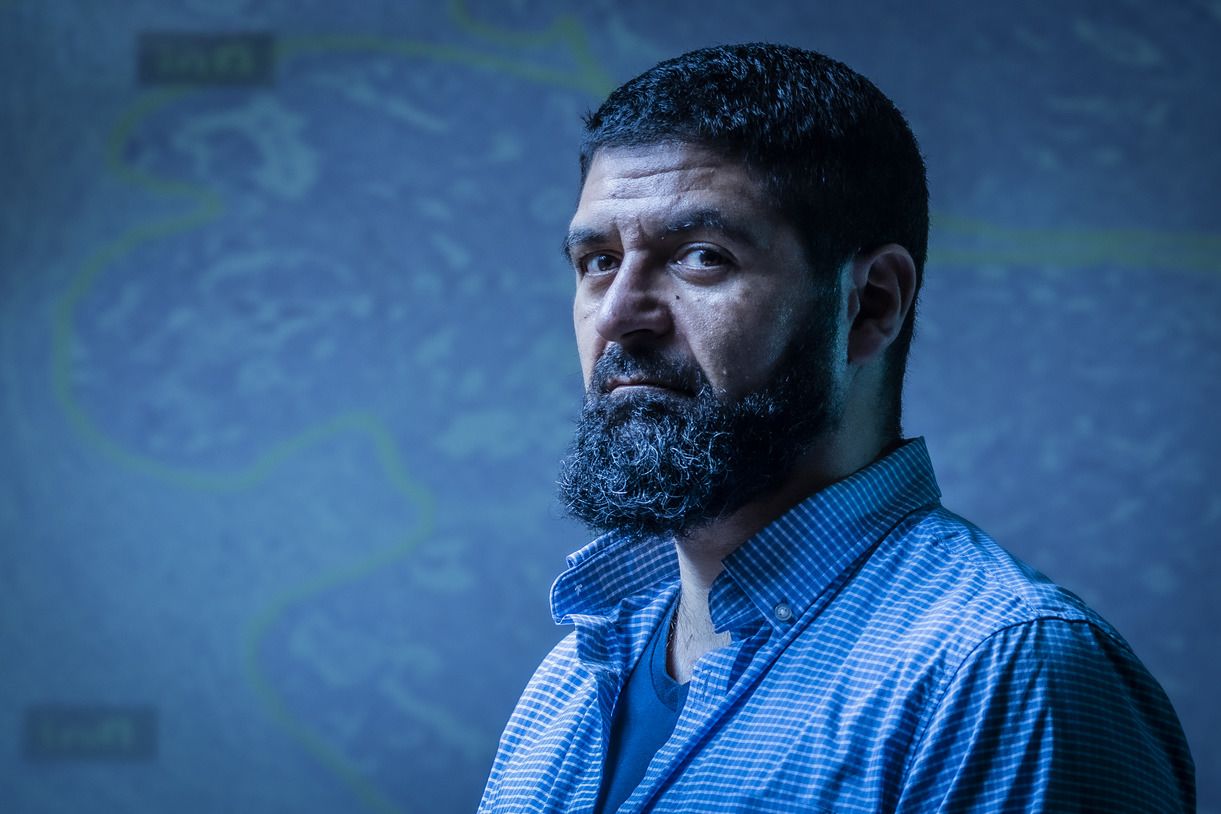
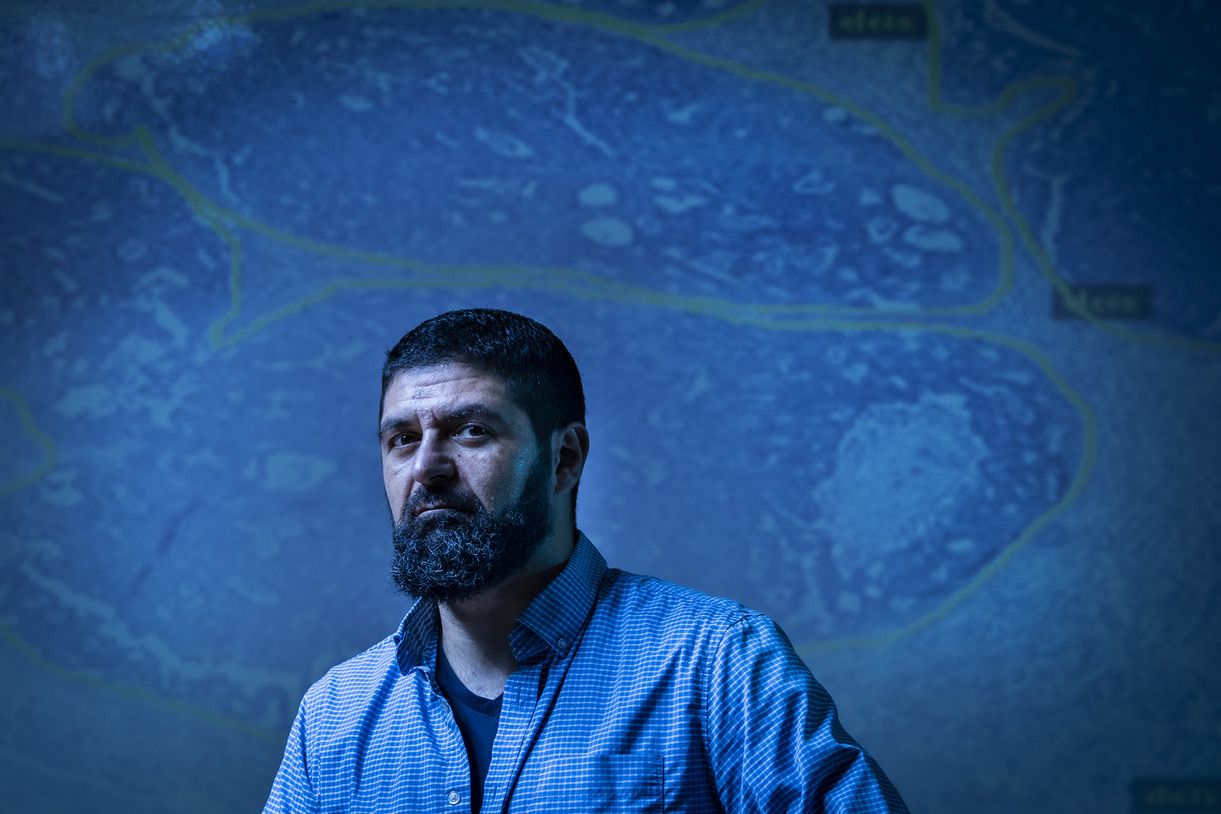
Meet Dr. Cory Budischak
Electrical and Computer Engineering Department
Engineering a 100% Renewable Future
Dr. Cory Budischak is an Associate Professor of Instruction in the Electrical and Computer Engineering Department. In addition to teaching, his professional pursuits focus on the transition to 100% renewable energy and what this energy system would look like if implemented. Dr. Budischak has moved from research to using his knowledge in advocacy work and policy implementation for state and national impact.
Dr. Budischak recently joined the Energy Efficiency and Electrification working group of Delaware's Governor's Energy Advisory Council (GEAC). The GEAC has set a goal to reduce emissions by 50% by 2030 and eliminate emissions entirely by 2050. Dr. Budischak's working group examines "current energy efficiency programs, transportation electrification, electric vehicles, building electrification, reliability and other topics raised by members". Through each meeting, this group will be working towards policy implementation in the state of Delaware.
In considering emissions, Dr. Budischak thinks of the energy system as a whole, as opposed to segmenting energy systems based on type. An example he proposed to the working group was electric vehicle expansion. Emissions will be reduced as electric vehicles become more popular. In addition, electric vehicles can also make renewable energy less expensive by scheduling charging when sunlight or wind are most abundant. Dr. Budischak believes that considering the energy system as a whole is the most productive and cost-effective way to reduce emissions.
In addition to his advocacy work, Dr. Budischak is passionate about effective engineering instruction/support and consistently implements these practices in the classroom. He incorporates problem-based learning, flipping the classroom, design thinking, and teaching through interactive games to reach students who may not have been reached by traditional lectures. In 2023, Dr. Budischak was part of the College of Engineering’s inter-departmental collaboration team that led a workshop on reframing academic rigor to set students up for success in and beyond the classroom. He covers seven undergraduate courses in the College of Engineering, including the first engineering course all students must take: Introduction to Engineering and Engineering Technology. Dr. Budischak’s passion for decarbonizing the energy system provides a forward-thinking viewpoint to his instruction, as he helps his students look towards a future that examines the ramifications of energy production in addition to the production itself.
As a first-generation college graduate, supporting similar students through their college journey is of the utmost importance to Dr. Budischak. Having recently received a $1.5 million grant from the National Science Foundation alongside Dr. Shawn Fagan (pictured, right), Dr. Budischak helped to establish and run the Temple Sustainable Temple Energy and Power Scholars (STEPS) program. The STEPS program provides support to low-income, high-achieving students interested in electrical engineering. Students in this program gain access to scholarships and mentors throughout their undergraduate experience. Still in its first year, Dr. Budischak looks forward to seeing the positive results from STEPS and helping other schools to develop similar programs.
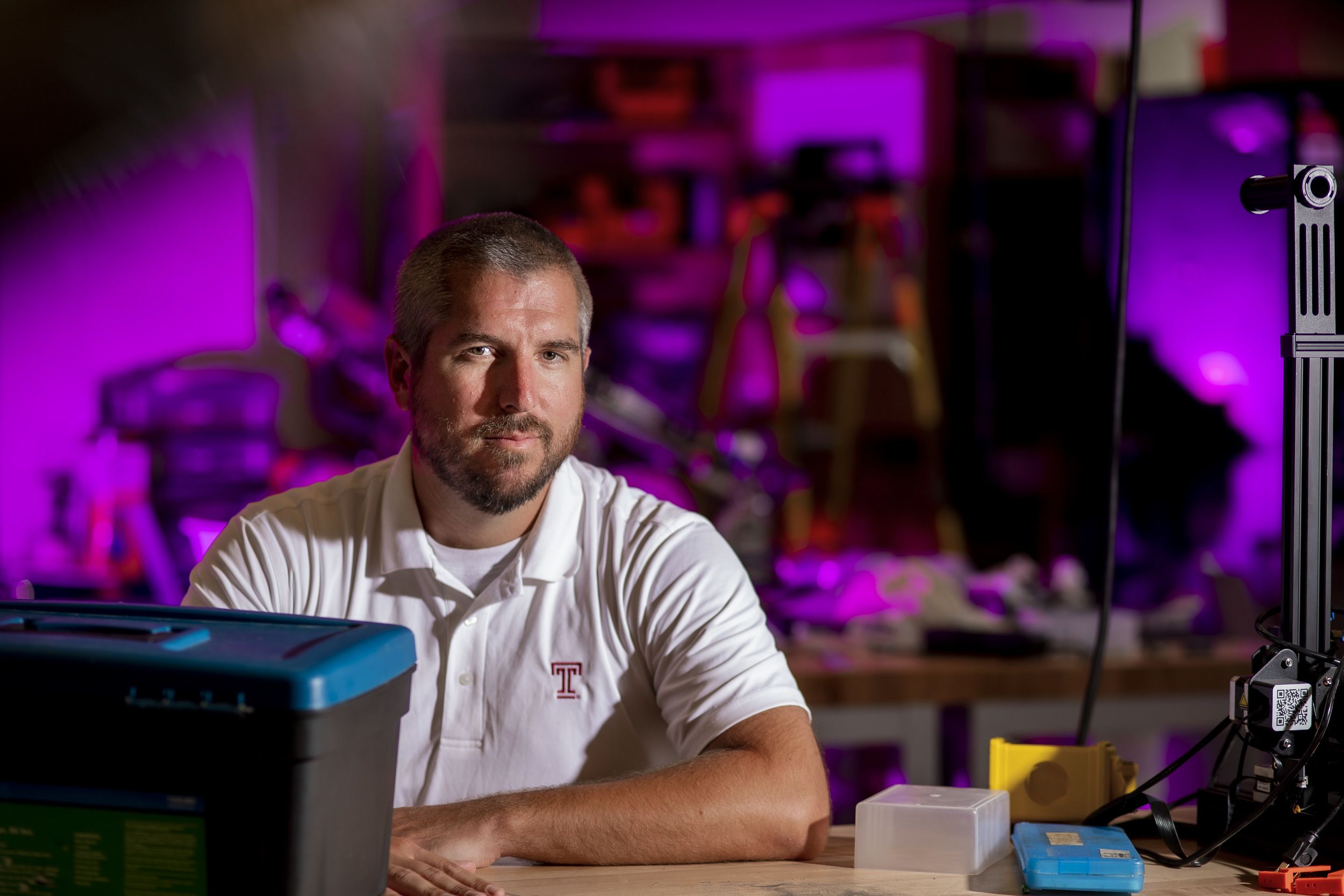
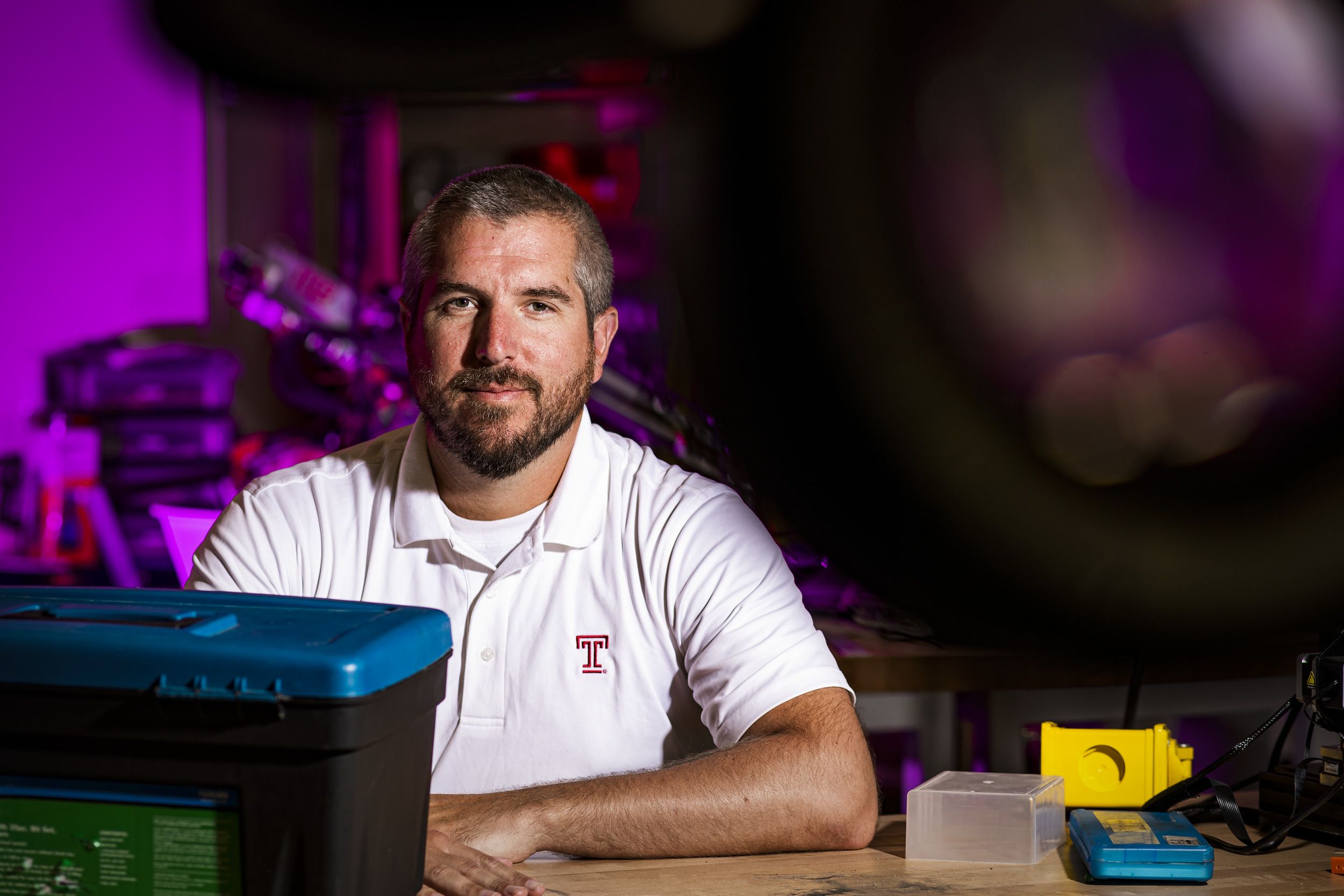
Engineering, Technology and Management Changemakers
Meet Justin Kerney
Engineering, Technology & Management Department
A People-First Approach
Justin Kerney is an industrial and systems engineering student. Coming from a family of engineers of various disciplines, the people-first approach of industrial and systems engineering (ISE) drew him to the major. The ISE major focuses on engineering fundamentals and applies them to the business sector to improve operations and systems. Alongside honing his technical skills, Kerney has prioritized his leadership and communication skills to prepare for a career bridging the gap between engineering and business.
Temple University and the College of Engineering checked all the boxes for Kerney as he was applying to colleges. With a multitude of study abroad opportunities, a club tennis team to join, a city-setting, and overall affordability, the decision was easy. He also noted the College of Engineering's ABET accreditation, which made him confident in the curriculum he’d be following.
Kerney initially enrolled as a bioengineering major but learned more about ISE and its crossover between engineering, business and a prioritization of people. The concept of clean manufacturing, an eco-friendly and human-centered approach, inspired him to change his major to ISE his sophomore year.
Planning on a career in communicating engineering concepts between technical and non-technical staff, a well-rounded college experience was crucial to Kerney. He joined Temple’s Club Tennis team. For him, spending a semester abroad was the first step in becoming a more well-rounded and open-minded individual. Working with the college's advising staff early in his freshman year, he was able to select the ideal semester to study abroad at Temple’s Rome campus while staying on track for his expected graduation date.
In Rome, Kerney focused on expanding his worldview and learning about cultures, returning to the U.S. with a deeper understanding of both personal and professional development in his engineering journey. Many of the arts and general education classes he took in Rome provided him with new ways to approach challenges in and out of the classroom.
Prioritizing the combination of communication and technical skills, Kerney also serves as a supervisor at Temple’s Mathematics Consulting Center and is a member of the engineering fraternity Theta Tau Pi Epsilon, open to all engineering students. His role as a tutor allows him to help fellow students while sharpening his own math skills. Being a member of Theta Tau has promoted his sense of community at the College of Engineering.
Alongside his extracurricular activities, Kerney’s passion for the ISE field keeps him engaged in the classroom. An aspect of ISE he values is the ability to see tangible results and the outcome of a fixed problem. His favorite course, Systems Thinking and Modeling, allowed Kerney and his classmates to try their hand at solving prominent world problems.
At the beginning of the semester students choose a problem they’d like to analyze. Kerney and his partner chose to analyze sea level rise in coastal Florida. Using a software program, he and his partner input various factors and manipulated them to develop a model determining root causes of sea level rise. At the end of the semester, they developed a report with a solution to deter sea level rise based on all the possible outcomes. The course allowed Kerney to exercise systems thinking and see the potential impact of his future career.
Kerney’s plans for the future are heavily influenced by his experiences as an undergraduate student. He recently completed a summer internship with AVTECH working on quality assurance engineering, technical writing, software work, and coordinating amongst different teams, gaining valuable experience in his future career field.
Placing a high value on education, Kerney is currently exploring options for a master’s degree. From his student organization involvement and travel experience, he knows he’s happiest when working on a team and can travel for work. He hopes to combine these passions to work as a conduit between business and engineering teams in a highly collaborative role.
Supported by faculty and peers, Kerney’s journey through Temple’s College of Engineering has provided holistic growth and understanding he hopes to use to improve lives through engineering.
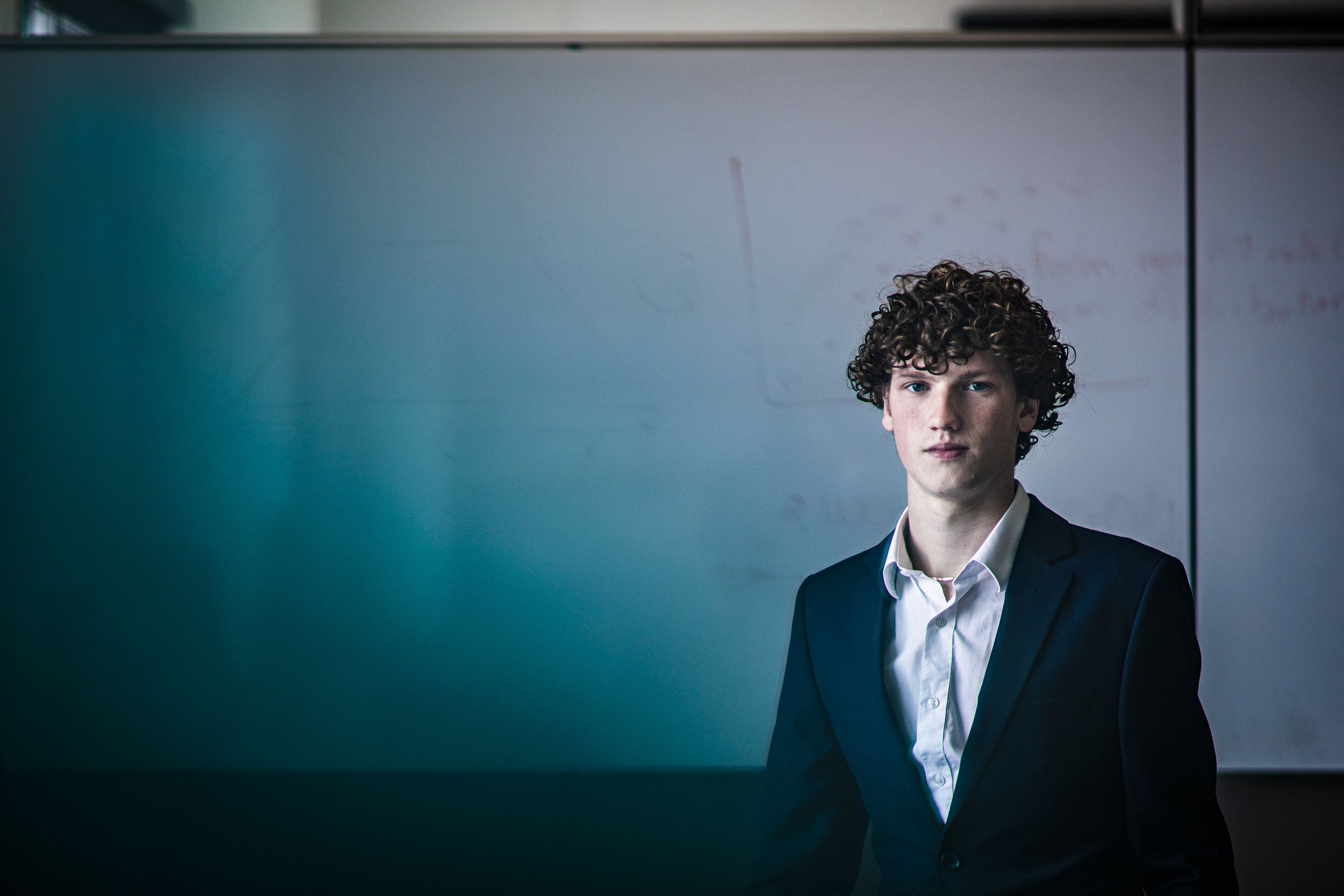
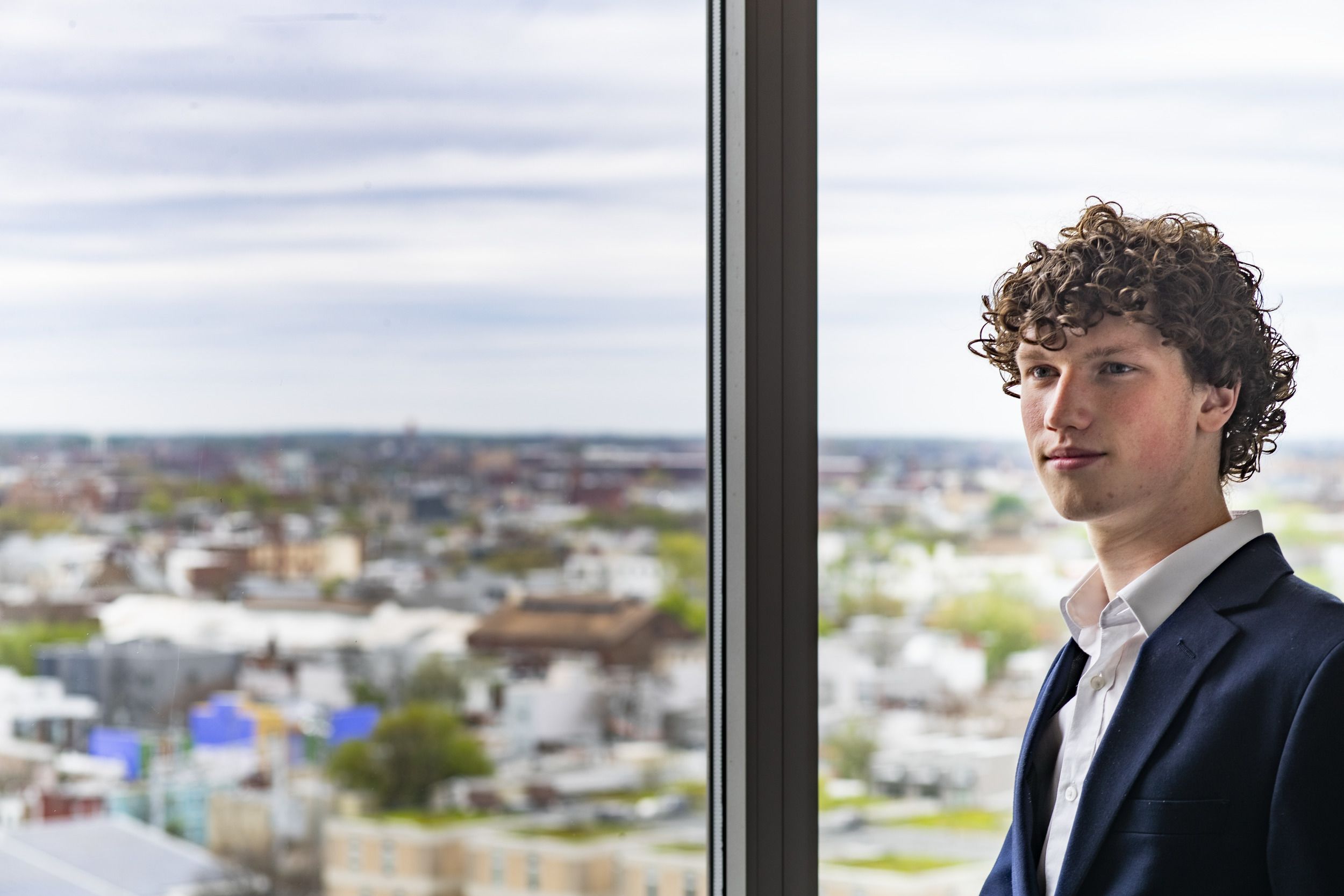
Meet Dr. Thomas Edwards
Engineering, Technology & Management Department
Engineering the Leaders of Tomorrow
Dr. Thomas Edwards is chair of the Engineering, Technology, and Management department, overseeing the department’s curriculum and teaching a handful of graduate and undergraduate courses at the College of Engineering. With decades of professional engineering and management experience, including 10 years as the general manager of a publicly traded company, Dr. Edwards strives to provide his students with the skills they need to become effective leaders in the engineering field and beyond.
After graduating with a degree in mechanical engineering, he began the first half of his career as an aerospace engineer where he worked on projects such as the Thiokol Star 6B rocket motor and the tele-operator retrieval system. His first job as a Chief Engineer was at GE (General Electric), developing a guided projectile to defend Navy ships from missile attacks. Dr. Edwards cites his early work on these high-pressure projects as unknowingly preparing him for his future career in management.
His first experience leading a team came at GE, where he led a team of approximately 20 people of various disciplines such as aerodynamics and fire control software, to name a few. Managing individuals of different disciplines proved to be excellent practice in honing leadership skills for Dr. Edwards. As his team approached him with issues in the project, he guided them towards a solution, even if the issue was outside of his realm of mechanical engineering expertise. His passion for effective leadership led him to his next role as general manager of the Air Pollution Control Division at Met-Pro Corporation.
Having already earned an MBA and master's in mechanical engineering, he pursued his management doctorate while simultaneously working full-time to develop a Corporate New Product Development Group. Working as the new product manager while obtaining his doctorate allowed Dr. Edwards to put the theory he was studying into practice at a publicly traded company; an invaluable experience.
Already teaching as an adjunct professor part-time as he finished his doctorate, Dr. Edwards leaned into his new passion for teaching and student success and pursued a full-time career in teaching at Temple University College of Engineering.
Originally hired to run the Engineering Management program, Dr. Edwards developed a proposal to establish the Engineering, Technology, and Management program, serving as the department chair since its inception. He now teaches two graduate courses and the undergraduate engineering entrepreneurship course.
Dr. Edwards takes pride in the rapport he develops with his students, encouraging students to contact him with any workplace problems they have even after graduating.
While the leadership skills he imparts on his students will propel them through their mid-career, he provides them with the tools they need to start the journey from day one of their first job.
In addition to his full-time position at the College of Engineering, Dr. Edwards is an advocate for effective leadership of neuro-divergent employees with a focus on how leaders can change their approach to make employment more accessible for autistic individuals. He has published a book and given a Ted Talk on the topic.
Taking from his own successful career in industry and his experience in various academic programs, Dr. Edwards strives to shape his students today into the effective and inclusive leaders of tomorrow.
Listen to Tom's Ted Talk here:
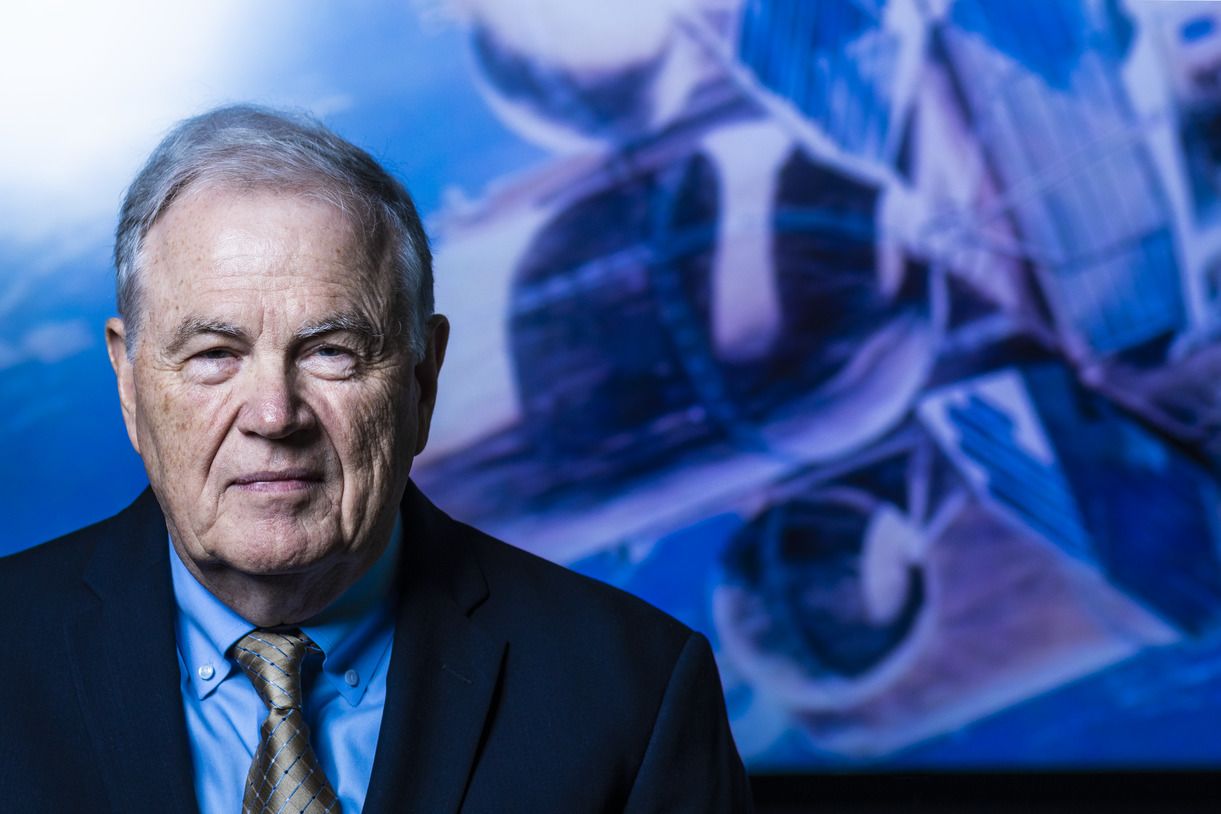
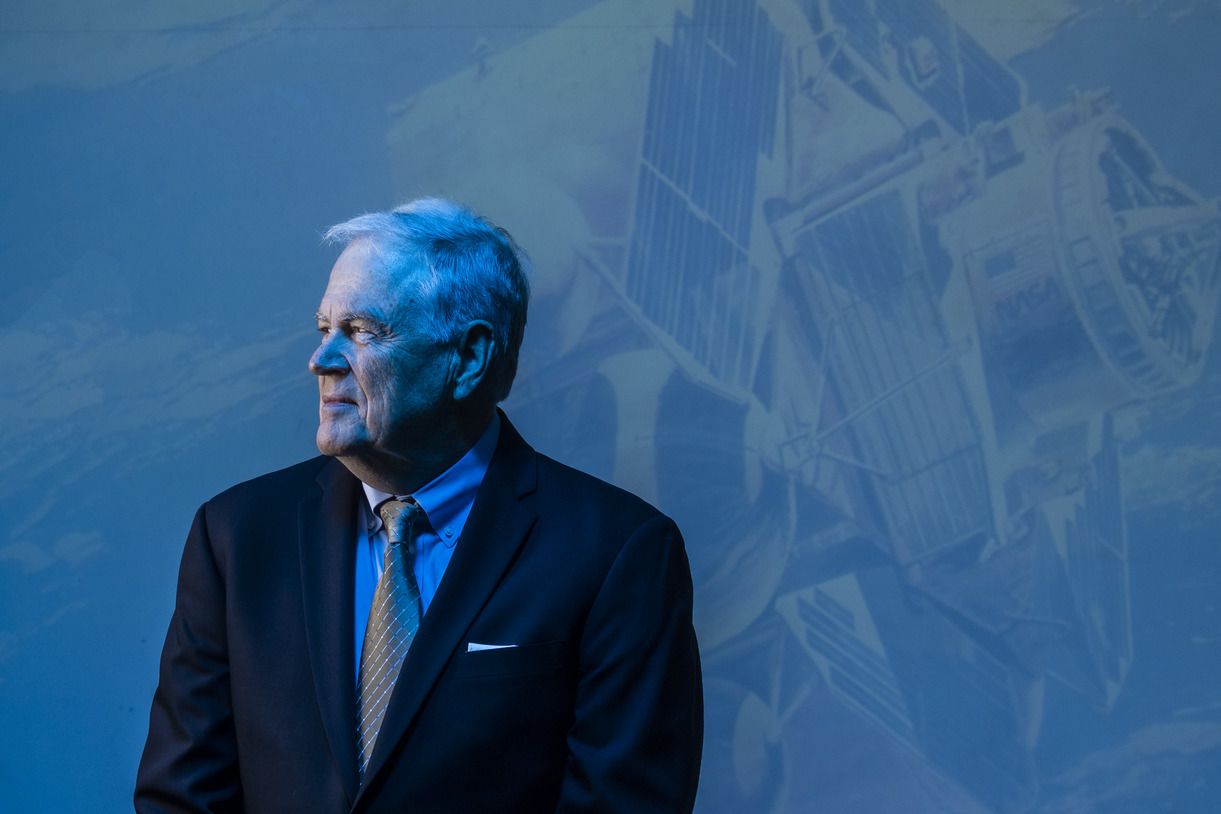
Meet Dr. Julie Drzymalski
Engineering, Technology & Management Department
Tackling Human-Centered Crises
Dr. Julie Drzymalski is a Professor of Instruction and Director of the Industrial and Systems Engineering program. Her teaching and research interests lie at the crossroads of operations research and systems modeling. Her current research pursuits involve applications of social systems modeling to tackle human-centered crises.
As a Professor of Instruction, Dr. Drzymalski works with students and guides them through the research process. In a recent project, she led a senior design team in evaluating the human-centered crisis of Housing Insecurity in Philadelphia. In this year-long project, her senior design team developed a model to accurately predict the number of housing insecure individuals in Philadelphia based on demographics and social, political, and environmental factors. Students then used this model to determine root causes to guide the ideal placement of resources in the city to lessen housing insecurity. Models such as this can be used to advise public policy in determining the most effective way to implement public resources and allocate funding.
In their research, Dr. Drzymalski and her students evaluated not only model of system dynamics literature, but also social science literature, which is not typically done in engineering research. Dr. Drzymalski incorporates methods, such as this type of cross-disciplinary research, to provide social context to industrial and systems engineering principles taught in the classroom.
Student success is crucial to Dr. Drzymalski. How students learn is just as important to her as what students learn. Dr. Drzymalski was part of the College of Engineering's inter-departmental collaboration team that led a workshop on reframing academic rigor to set students up for success in and beyond the classroom.
With a well-rounded engineering background, Dr. Drzymalski pulls from her combined industry and research experience in supply chain robustness and modeling of sociotechnical systems to provide insight into a field facing unprecedented challenges. Her industrial experience includes various quality engineering, project and program management positions in the construction related industries of the greater Philadelphia and New York City area.
She is a fellow of the American Society of Engineering Management, a Governor of the Order of the Engineer, and an active member of the Institute of Industrial and Systems Engineers. Dr. Drzymalski teaches and mentors undergraduate students in eight courses in the College of Engineering.
Hear more from Julie and her impact here:
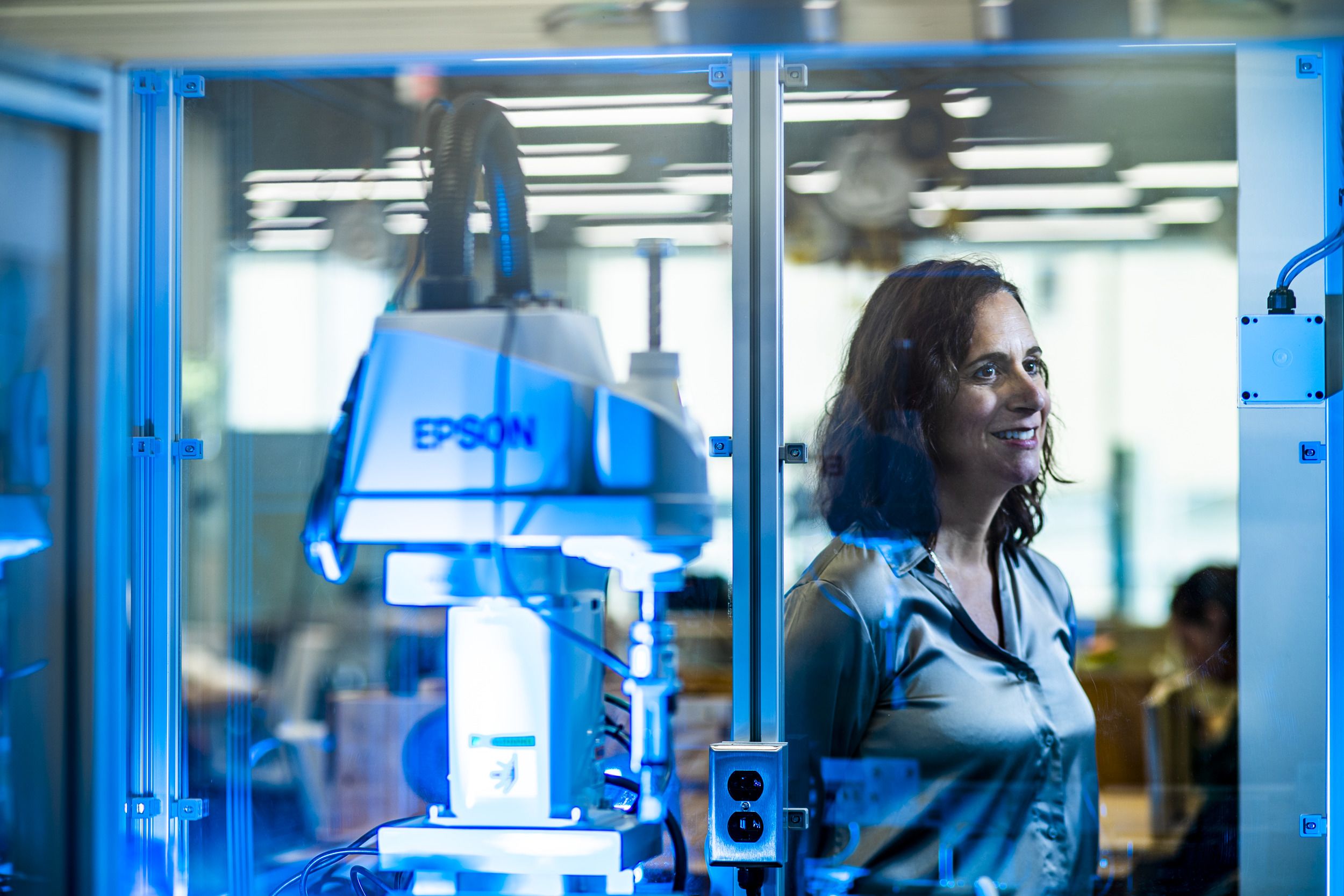
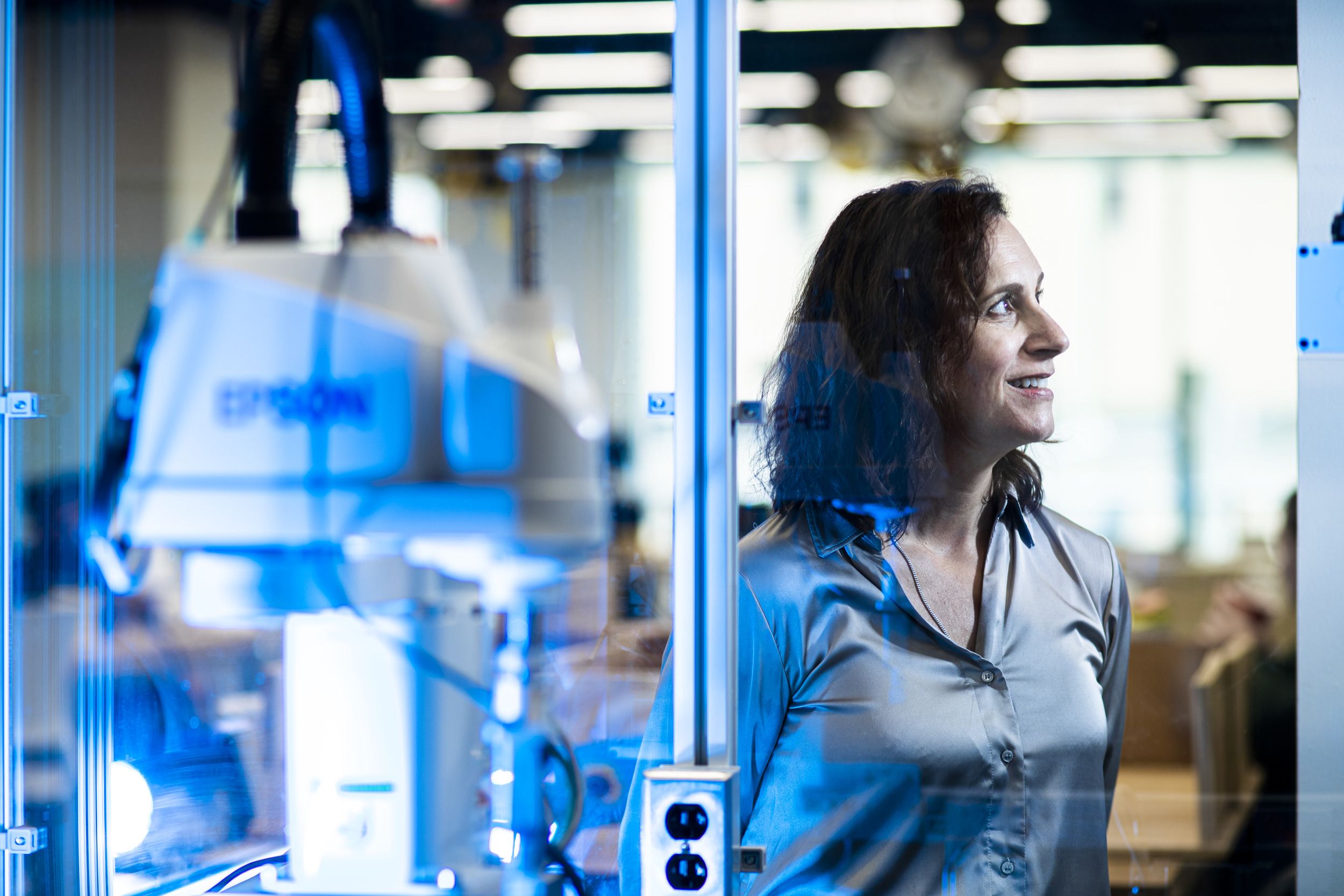
Mechanical Engineering Changemakers
Meet Shane Britton
Mechanical Engineering Department
Resolution in Research
Shane Britton, ENG ‘25, is a recent mechanical engineering graduate. Arriving at the College of Engineering as a transfer student, Britton made the most of his time at Temple, discovering his passions, honing his engineering skills and setting the next steps of his future in motion.
Britton’s higher education journey began at Bucks County Community College, where he originally majored in mathematics. He eventually switched his major to engineering, preferring the application aspect of engineering.
With its proximity to home and affordability, Temple University was the clear next step for him upon earning his associate degree. He transferred into the College of Engineering and hit the ground running.
Britton selected mechanical engineering as his major. With its versatility and wide variety of career options, mechanical engineering was a natural fit, allowing him to explore multiple fields. He was drawn to the challenges and processes of taking a design and making it into a tangible product.
While arriving at Temple University as a transfer student initially felt overwhelming, Britton quickly found his place on campus, appreciating the diverse student body and unique perspectives each student brought to the classroom. Temple, well-known for a vibrant campus and community, allowed Britton to embrace life outside of academics, even becoming a frequenter of the famed food truck scene.
Britton found his new engineering courses equally challenging and rewarding, none more so than Computation and Analysis of Linear Systems. Drawn to the subject’s complexity, he went on to become a TA for the course for three semesters, hosting homework sessions, tutoring students one-on-one, and even deepening his own personal understanding of the course material.
While learning about the different disciplines engineering has to offer, a professor encouraged Britton to enroll in a robotics class. Robotics being a multi-disciplinary field with mechanical and electrical engineering, Britton again did what he does best - put his head down and got to work.
Eager to get started on his own accord, the summer before his robotics course began, he took the initiative to do his own personal research into the robotics field to prepare himself for the semester ahead. He learned ROS (Robot Operating System) 2, took some online courses in software programs and learned coding. Britton’s hard work paid off. When it came time for the final project in his first robotics course, his self-driven foundation gave him the knowledge he needed to have the fastest time in his final robotics course challenge. From there, he was hooked on robotics.
After seeking support from several professors and carefully reviewing his personal statement, Britton worked on his graduate school search, fueled by his newfound interest in robotics.
As a result of his hard work and dedication at Temple’s College of Engineering, Britton was accepted into the University of Pennsylvania to pursue a master’s degree in computer and information technology with the option to add a dual degree in artificial intelligence. During his graduate program, Britton hopes to master his programming skills and further contribute to robotics projects and research. Upon completing his master’s degree, he plans to either pursue a PhD or enter a career in the robotics industry.
From his humble beginnings at community college to his future in the Ivy League, Britton’s experiences at Temple University and the College of Engineering opened his eyes to the vast possibilities of his career and gave him the confidence to further pursue his passions.
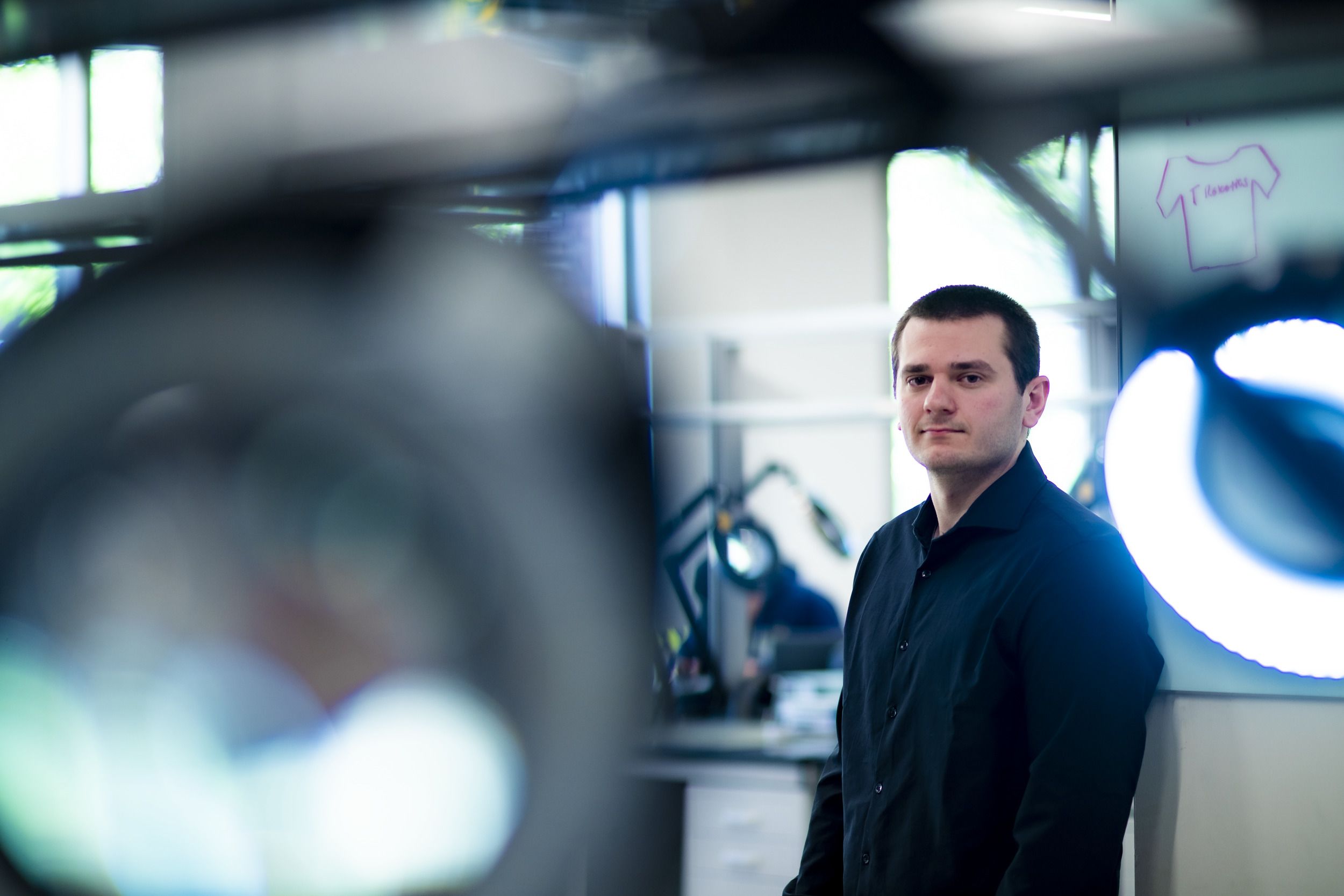
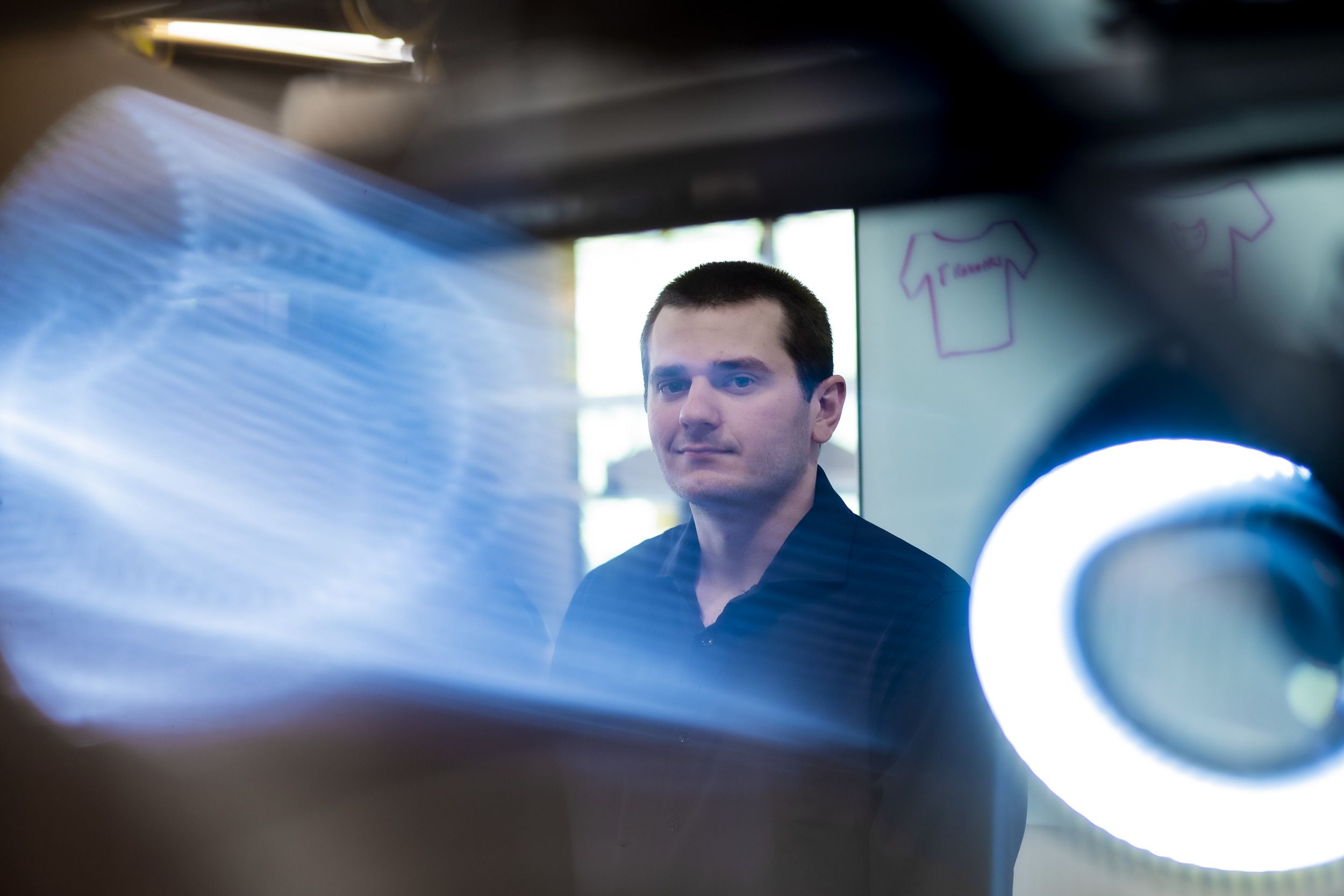
Meet Dr. Mohammad Kiani
Mechanical Engineering Department
Trailblazing Drug Research for Next-Generation Treatments
Dr. Mohammad Kiani is a professor in the Department of Mechanical Engineering with a secondary appointment in Bioengineering. Outside of the College of Engineering, he has another secondary appointment at the Katz School of Medicine in the Department of Radiation Oncology. Dr. Kiani has been at the College of Engineering for 20 years, sharing his interdisciplinary expertise with students in the classroom and in his research laboratory.
Having received degrees in electrical engineering, bioengineering, and completing a post-doctoral fellowship in biophysics, Dr. Kiani has a wealth of experience in multiple engineering disciplines. He has expertise in biofluid mechanics and is currently developing and using novel organ-on-chip (OOC) systems.
OOC is a multi-cell culture system that reproduces components of human tissue on a chip and can model certain organs and organ systems. This technology is used to better understand how organs work at the cellular level and for drug development and screening. During the drug approval process, the FDA now allows the use of data from OOC testing to be used in lieu of animal studies. Not only is the use of OOC more humane, but it also allows scientists to see how human cells react to candidate drugs in the early stages of testing, as sometimes drugs developed and tested in animals models function differently in humans.
Dr. Kiani uses OOC technology in several studies. One of his studies includes the development of a “tumor on chip” to study how lung cancer cells cross the blood-brain barrier to metastasize to the brain to develop better treatments for this deadly disease.
His current work with OOC technology spurred off his previous work in targeted drug delivery. Targeted drug delivery has come a long way since Dr. Kiani first began his work in the field in the 90s. Many medications now come in nano-capsules, for example, with biomarkers guiding them to release the drug in parts of the body where it is needed most. He is now using OOC models to design targeted drug delivery systems for optimal release.
Outside of his research, Dr. Kiani has prioritized giving back to the community. In 2001, alongside his colleague Dr. Robert Malkin, he co-founded Engineering World Health. With help from engineering interns, Engineering World Health at one point delivered engineering support and infrastructure to underserved medical clinics in 13 different countries in Central America and Africa. Their work paired students with hospitals in small, underserved communities and trained technicians to work at their local hospitals. Dr. Kiani previously served as the president of Engineering World Health and was on its board of directors for several decades.
Dr. Kiani has also served as a fellow of the American Heart Association (AHA) for over 20 years. He has received significant funding from the AHA during his career, served on several AHA advisory panels and led their effort to better fund bioengineering research.
Dr. Kiani’s interdisciplinary background has benefited engineering students for decades. He's taught a varied array of courses including undergraduate, graduate, and general education courses and has even co-taught a course in philosophy. He currently supports a well-staffed lab of graduate and undergraduate students and post-doctoral fellows. He believes that if a person is committed and passionate about what they do, they will be able to do good work with significant implications for people around the world.
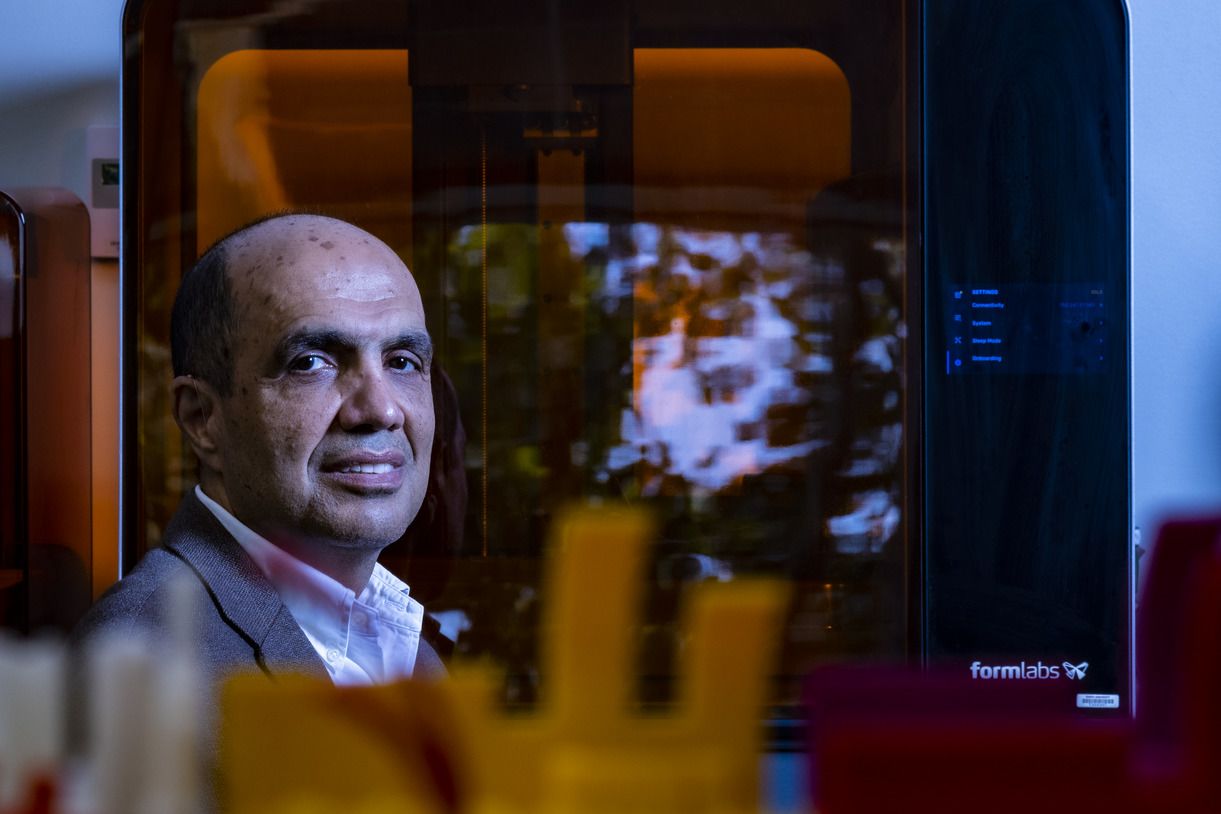
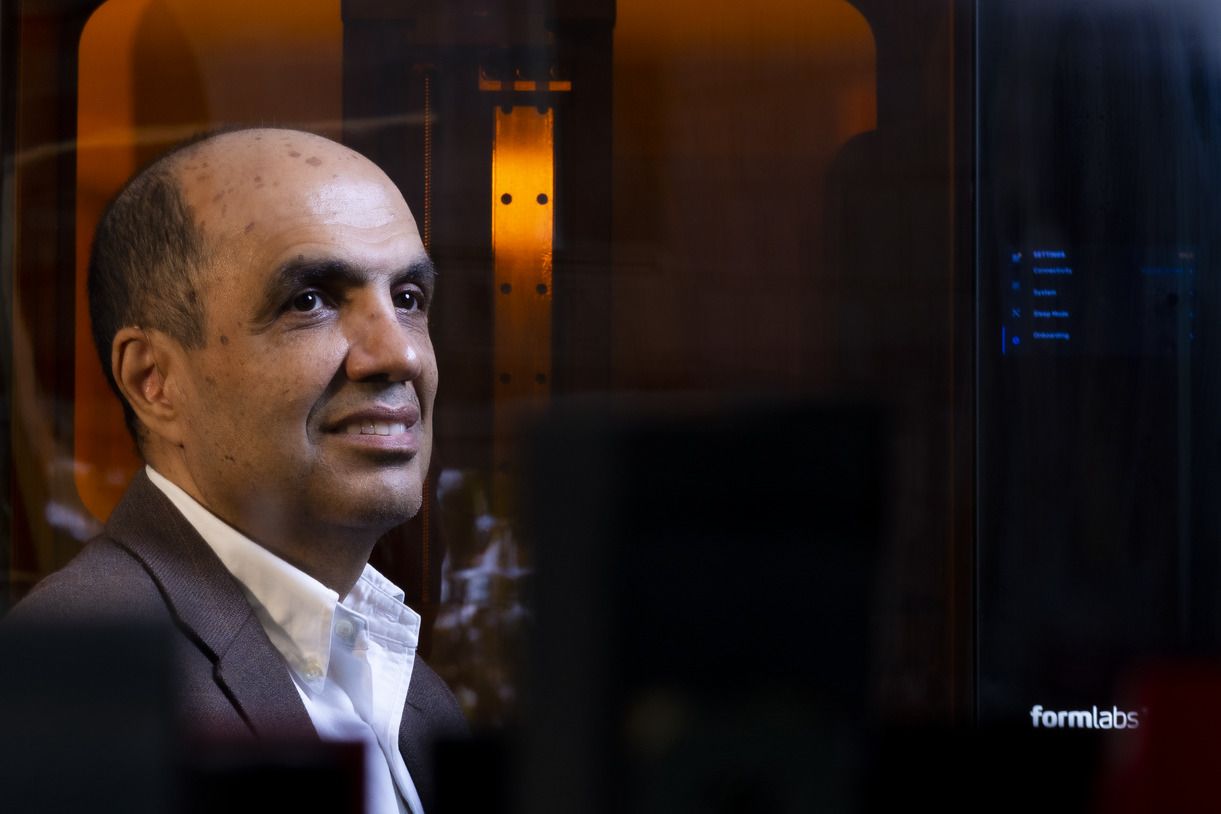
Meet Dr. Elham Sahraei
Mechanical Engineering Department
Partnering Innovation with Safety
Dr. Elham Sahraei is an Associate Professor in the Department of Mechanical Engineering. Her research focuses on the mechanical safety of lithium-ion batteries under extreme loading conditions. This research extends to full-scale vehicle crash analysis, occupant protection, and analysis of roadside safety structures.
In addition to teaching five graduate and undergraduate courses in the College of Engineering, Dr. Sahraei is the director of the Electric Vehicle Safety Lab (EVSL). The EVSL focuses on improving safety through the investigation of mechanical characteristics of lithium-ion batteries for electric vehicles. Dr. Sahraei has had several research sponsors over the years, including the Office of Naval Research, Stellantis, Ansys, and Caresoft. These sponsors play a major role in the electric vehicle industry and rely heavily on research like Dr. Sahraei’s to improve the safety of their vehicles.
Dr. Sahraei and the EVSL use a combination of live crash tests as well as computer modeling to simulate how the lithium-ion battery reacts in various crash scenarios. In an electric vehicle crash, there is the risk of fire, explosion, or the release of electrolyte in battery acid. In simulating these crash scenarios, Dr. Sahraei and her team then develop computer models of these vehicles. Companies then use these models when developing their electric vehicles to predict failure in case of a crash, and to hopefully prevent these catastrophic events from occurring. Dr. Sahraei’s research has a direct impact on the development of the quickly expanding electric vehicle industry.
Dr. Sahraei recently received a donation and funding from Caresoft and the Office of Naval Research, respectively, that has created a new line of research for Dr. Sahraei and her students. Caresoft donated a database made up of vehicle models and vehicle data, including fully characterized vehicles. With the cost of developing a vehicle approaching over a million dollars, this donation is a huge development for the EVSL. The funding and partnership from the Office of Naval Research provides Dr. Sahraei’s students with opportunities to complete internships and work experiences with the Navy to further their research. Additionally, the project with the Office of Naval Research allows Dr. Sahraei and her faculty partners to validate the Sahraei Failure Criterion.
Having researched lithium-ion batteries within electric vehicles for over 14 years, Dr. Sahraei has been a part of the industry from its early beginnings and has seen the industry go from one with little interest, and even disregard, to a rush on research and development as countries around the world pass legislation implementing the use of electric vehicles.
